In today’s digital age, cybersecurity breaches have become more prevalent and sophisticated, making the security of your organization’s digital assets a top priority. The practice of penetration testing, often referred to as pen testing, is a crucial component of a robust cybersecurity strategy. In this comprehensive article, we will explore the world of penetration testing, delving into its importance, benefits, and frequently asked questions.
The Importance of Penetration Testing
With cyber threats constantly evolving, ensuring the security of your organization’s digital assets is paramount. Penetration testing involves simulating cyberattacks on computer systems, networks, or applications to identify vulnerabilities before malicious hackers can exploit them. By understanding why your organization needs penetration testing, you can proactively safeguard your digital infrastructure.
The Need for Penetration Testing
Identifying Vulnerabilities: Penetration testing allows you to discover vulnerabilities in your systems and applications before cybercriminals do. This proactive approach enables you to address security weaknesses and fortify your defenses.
Preventing Data Breaches: Unpatched or misconfigured systems often serve as entry points for attackers. Penetration testing helps you find and rectify these issues, reducing the risk of data breaches and the associated financial and reputational damage.
Preserving Customer Trust: Customers trust organizations with their data. A data breach can erode that trust. Regular penetration testing demonstrates your commitment to safeguarding customer information, enhancing trust and loyalty.
Meeting Compliance Requirements: Many industry regulations and data protection laws, such as GDPR, HIPAA, and PCI DSS, mandate regular security assessments. Penetration testing helps ensure compliance, avoiding potential fines and legal consequences.
Understanding Security Posture: Penetration testing provides insights into your organization’s current security posture. It helps you assess your readiness to defend against real-world cyber threats and understand where improvements are needed.
Enhancing Incident Response: In the event of a security incident, having experienced penetration testers on your side can be invaluable. They can help analyze the attack, identify the entry point, and assist in mitigating the damage.
Testing New Systems and Applications Whenever your organization deploys new systems or develops applications, penetration testing can help ensure they are secure from the start. This proactive approach reduces the risk of launching vulnerable products.
The Significance of Penetration Testing: Unearthing Hidden Vulnerabilities
In today’s hyper-connected and digitally dependent world, the consequences of a single unnoticed vulnerability in an organization’s systems or applications can be catastrophic. This is where penetration testing, often referred to as pen testing, plays a pivotal role. Penetration testing is a proactive cybersecurity practice that helps organizations identify hidden vulnerabilities that might otherwise remain undetected. Let’s elaborate on the significance of this process.
Proactive Vulnerability Discovery:
- Penetration testing is a proactive approach to cybersecurity. It involves ethical hackers or security experts simulating real-world cyberattacks on an organization’s systems, networks, or applications. This simulation aims to uncover security weaknesses before malicious hackers have the chance to exploit them. By identifying vulnerabilities proactively, organizations can take steps to mitigate risks before they turn into actual security incidents.
The Hidden Threat Landscape:
- Cyber threats are constantly evolving, and attackers often seek out vulnerabilities that are not easily visible or accessible through routine security measures. These hidden vulnerabilities may exist in the form of unpatched software, misconfigurations, or undiscovered weaknesses in custom-built applications. They can serve as attractive entry points for cybercriminals. Penetration testing is designed to uncover these lurking threats, providing organizations with a more comprehensive understanding of their security posture.
Preventing Catastrophic Breaches:
- It only takes one unnoticed vulnerability for a cybercriminal to breach an organization’s defenses and gain unauthorized access to sensitive data or critical systems. Such breaches can result in significant financial losses, damage to reputation, and legal repercussions. Penetration testing acts as a proactive defense mechanism, helping organizations identify and remediate vulnerabilities before they are exploited. This preventative approach can prevent potentially catastrophic breaches.
Continuous Improvement:
- Cybersecurity is an ongoing process, and attackers continually adapt their tactics. Organizations that conduct regular penetration testing establish a culture of continuous improvement in their security posture. By consistently unearthing and addressing vulnerabilities, they can stay one step ahead of emerging threats and strengthen their overall cybersecurity defenses.
Comprehensive Risk Management:
- Penetration testing is a critical component of comprehensive risk management. It enables organizations to assess the effectiveness of their security controls and incident response procedures. By identifying hidden vulnerabilities, organizations can make informed decisions about where to allocate resources for risk mitigation, ensuring that their security investments are targeted and effective.
Meeting Regulatory Compliance through Penetration Testing
In today’s digital landscape, many industries are governed by strict regulatory requirements aimed at ensuring data protection and cybersecurity. These regulations exist to safeguard sensitive information and maintain the trust of customers and stakeholders. Penetration testing plays a crucial role in helping organizations meet these regulatory compliance standards, thereby avoiding hefty fines and legal complications. Let’s delve into the significance of penetration testing in the context of regulatory compliance.
Understanding Regulatory Requirements:
- Various industries, such as healthcare, finance, and payment processing, have their own set of regulatory standards and compliance requirements. For example, HIPAA (Health Insurance Portability and Accountability Act) governs healthcare data, while PCI DSS (Payment Card Industry Data Security Standard) applies to organizations that handle payment card data. These regulations outline specific security measures that organizations must implement to protect sensitive data.
Proactive Risk Mitigation:
- Regulatory bodies recognize that cyber threats are constantly evolving, and security measures must adapt accordingly. Penetration testing is a proactive approach that allows organizations to assess their security posture in real-world scenarios. By simulating cyberattacks, organizations can identify vulnerabilities and weaknesses that may exist in their systems or processes. This proactive risk assessment helps them take corrective actions before regulatory non-compliance occurs.
Identifying Vulnerabilities and Gaps:
- Penetration testing uncovers vulnerabilities and security gaps that may not be apparent through routine security checks or compliance audits. These vulnerabilities could include unpatched software, misconfigured systems, or overlooked weaknesses in custom applications. By addressing these issues, organizations ensure that they are not inadvertently violating regulatory standards.
Demonstrating Due Diligence:
- Penetration testing demonstrates an organization’s commitment to due diligence in cybersecurity. It provides tangible evidence that the organization is taking proactive measures to protect sensitive data and comply with industry-specific regulations. This proactive stance can be invaluable when demonstrating compliance to regulatory bodies or auditors.
Avoiding Fines and Legal Consequences:
- Non-compliance with regulatory standards can result in severe consequences, including hefty fines and legal actions. Regulatory authorities may conduct audits to assess an organization’s compliance status. Penetration testing helps organizations identify and rectify vulnerabilities and weaknesses that, if left unaddressed, could lead to non-compliance. By addressing these issues in advance, organizations reduce the risk of facing fines and legal complications.
Building Customer Trust:
- Demonstrating compliance with industry-specific regulations through penetration testing not only avoids legal issues but also builds trust with customers and partners. Customers are more likely to trust organizations that protect their sensitive data and comply with data protection regulations. This trust enhances the organization’s reputation and credibility.
Fortifying Network Security through Penetration Testing
In today’s digital age, networks serve as the lifeblood of modern organizations, facilitating communication, data transfer, and the functioning of critical systems. However, networks are also prime targets for cyber threats, making it imperative to assess and reinforce their security. Penetration testing is a powerful cybersecurity practice that plays a pivotal role in evaluating and strengthening network security. Let’s delve into the significance of penetration testing in fortifying network security.
Network Vulnerabilities Assessment:
- Networks are complex and constantly evolving, making them susceptible to vulnerabilities that may not be readily apparent. Penetration testing involves skilled security professionals simulating real-world cyberattacks on a network infrastructure. By doing so, they identify vulnerabilities, misconfigurations, and weaknesses that malicious actors could exploit.
Proactive Threat Mitigation:
- Penetration testing takes a proactive approach to cybersecurity. Instead of waiting for a security incident to occur, organizations use penetration testing to identify and address security weaknesses before cybercriminals can exploit them. This proactive stance reduces the risk of successful cyberattacks.
Realistic Threat Simulation:
- Penetration testers simulate a range of cyberattacks that mimic the tactics, techniques, and procedures used by actual attackers. This provides organizations with a realistic assessment of their network’s security posture and readiness to defend against sophisticated threats.
Comprehensive Security Evaluation:
- Network security extends beyond perimeter defenses. Penetration testing assesses various layers of network security, including firewalls, intrusion detection systems, access controls, and more. This comprehensive evaluation helps organizations identify vulnerabilities across the network infrastructure.
Customized Security Solutions:
- Penetration testing results provide actionable insights tailored to an organization’s specific network environment. These insights enable organizations to implement customized security solutions and strategies that address their unique security challenges effectively.
Risk Prioritization and Mitigation:
- Penetration testing reports prioritize identified vulnerabilities based on their severity and potential impact. This allows organizations to focus their resources and efforts on addressing the most critical security risks, reducing the attack surface, and enhancing network security overall.
Continuous Improvement:
- Network security is an ongoing process, and cyber threats continually evolve. Regular penetration testing establishes a culture of continuous improvement by helping organizations stay ahead of emerging threats. It enables them to adapt and enhance their security measures to meet evolving challenges.
Enhanced Incident Response:
- In the event of a security incident, organizations that have undergone penetration testing are better equipped to respond effectively. They can leverage the insights gained from testing to analyze the attack, identify the entry points, and implement immediate remediation measures.
Are you curious to see a real penetration testing report? Click on the link below and download one!
Latest Penetration Testing Report

Qulaysec: The Best Pentesting Service Provider
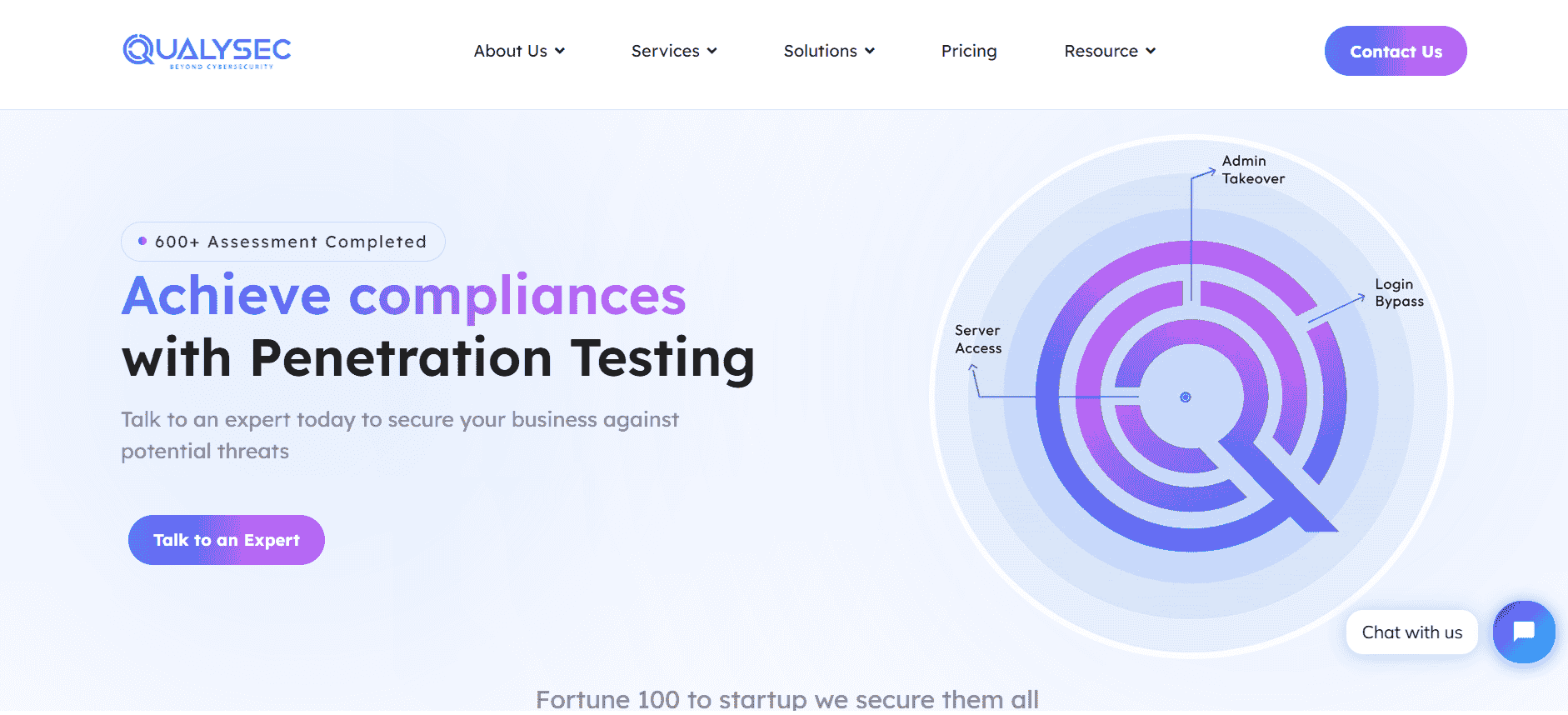
Qualysec is a cybersecurity company founded in 2020 that has quickly become one of the most trusted names in the industry. The company provides services such as VAPT, security consulting, and incident response.
Although Qualysec’s Oppressional office is in India, Qualysec’s extensive knowledge and expertise in cybersecurity testing services have earned a reputation among the Penetration Testing Service Providers.
Technicians at Qualysec can detect flaws that fraudsters could abuse. After these flaws have been found, Qualysec collaborates with the organization to establish a plan to address them and boost the company’s overall security posture. Among the several services available are:
- Web App Pentesting
- Mobile App Pentesting
- API Pentesting
- Cloud Security Pentesting
- IoT Device Pentesting
- AI /ML Pen-testing
The Qualysec team is made up of seasoned offensive specialists and security researchers who collaborate to give their clients access to the most recent security procedures and approaches. They provide VAPT services using both human and automated equipment.
In-house tools, adherence to industry standards, clear and simple findings with reproduction and mitigation procedures, and post-assessment consulting are all features of Qualysec’s offerings.
The solution offered by Qualysec is particularly beneficial for businesses that must adhere to industry rules or prove their dedication to security to clients and partners. So, by doing routine penetration testing, businesses may see weaknesses and fix them before thieves attack them.
As a result, Qualysec is rated as the best of the best Penetration Testing Service Providers.
Gaining Stakeholder Confidence through Penetration Testing
In today’s digital landscape, trust is paramount. Customers, partners, and stakeholders expect organizations to handle their data responsibly and protect it from cyber threats. Demonstrating a strong commitment to cybersecurity not only safeguards sensitive data but also instills confidence among these stakeholders. Penetration testing is a critical practice that plays a pivotal role in showcasing this commitment and gaining the trust of those who rely on your organization. Let’s elaborate on how penetration testing accomplishes this:
Proactive Cybersecurity Stance:
- Penetration testing is a proactive approach to cybersecurity. It involves ethical hackers or security experts actively testing an organization’s systems, networks, and applications to identify vulnerabilities. This proactive stance sends a clear message that your organization takes cybersecurity seriously and is committed to protecting sensitive data.
Real-World Security Assurance:
- Penetration testing simulates real-world cyberattacks, using tactics and techniques employed by malicious actors. By undergoing such testing, your organization demonstrates its readiness to defend against actual threats, reassuring stakeholders that their data is in capable hands.
Transparency and Accountability:
- Engaging in penetration testing showcases transparency and accountability. You are openly acknowledging the importance of identifying and addressing security vulnerabilities. This transparency fosters trust among stakeholders, as they can see that you are actively taking measures to protect their data.
Data Protection:
- Customers, partners, and stakeholders entrust you with their sensitive data. Penetration testing is a means of ensuring that this data is safeguarded. When stakeholders know that your organization is regularly testing its security measures, it reinforces their confidence that their information is being handled responsibly.
Compliance with Data Protection Laws:
- Many industries are subject to data protection regulations and compliance requirements. Penetration testing helps your organization meet these obligations by identifying and mitigating security vulnerabilities. This not only ensures compliance but also demonstrates a commitment to following the law.
Reputation Enhancement:
- A strong commitment to cybersecurity through penetration testing can enhance your organization’s reputation. Customers and partners are more likely to trust and continue doing business with organizations that prioritize the security of their data. A positive reputation can translate into customer loyalty and growth.
Competitive Advantage:
- In a competitive marketplace, organizations that actively demonstrate their commitment to cybersecurity through practices like penetration testing gain a competitive advantage. It sets you apart as a responsible and secure partner, attracting potential customers and partners.
Incident Response Preparedness:
- In the unfortunate event of a security incident, organizations that have undergone penetration testing are better prepared to respond effectively. This readiness is reassuring to stakeholders, as they know that you have a plan in place to mitigate the impact of such incidents.
Staying One Step Ahead with Penetration Testing
In the ever-evolving landscape of cybersecurity, the tactics and techniques used by cybercriminals are constantly changing and becoming more sophisticated. To effectively protect your organization’s digital assets, it’s crucial not just to react to known threats but to anticipate and prepare for the latest and emerging threats. Penetration testing is a strategic cybersecurity practice that helps organizations stay one step ahead by actively anticipating and addressing these evolving threats, ensuring that their defenses remain up to date. Let’s elaborate on how penetration testing accomplishes this:
Continuous Threat Assessment:
- Cybercriminals adapt quickly to new security measures and technologies. They continuously devise new attack vectors and methods to exploit vulnerabilities. Penetration testing is an ongoing process that mimics these evolving threats. By regularly assessing your systems and applications, you can identify vulnerabilities that may be targeted by the latest attack techniques.
Realistic Attack Simulation:
- Penetration testers use a variety of tools and methodologies to simulate realistic cyberattacks. These simulations replicate the tactics and strategies used by actual hackers, ensuring that your organization is tested against the most current threats. This realism allows you to see how your defenses hold up in a dynamic threat environment.
Identification of Zero-Day Vulnerabilities:
- Zero-day vulnerabilities are those for which no official patch or fix is available, making them highly attractive to attackers. Penetration testing may reveal unknown vulnerabilities within your systems, including zero-days. Identifying these vulnerabilities allows you to take immediate action to mitigate the risk.
Adaptive Security Measures:
- Penetration testing results provide valuable insights into your organization’s security posture. These insights can guide the implementation of adaptive security measures that can quickly respond to emerging threats. For example, if a penetration test uncovers a new type of attack, you can promptly adjust your defenses to counter it.
Focused Resource Allocation:
- Cybersecurity resources are often limited, and it’s essential to allocate them strategically. Penetration testing helps you prioritize resource allocation by identifying the most critical vulnerabilities and threats. This ensures that your efforts and investments are directed where they can have the most significant impact.
Security Patch Management:
- Timely application of security patches and updates is crucial for protecting against known vulnerabilities. Penetration testing can uncover systems or applications that have not been patched, making it easier to maintain an up-to-date security posture.
Enhanced Incident Response:
- In the event of a security incident, organizations that regularly conduct penetration testing are better prepared to respond swiftly and effectively. The insights gained from testing can help incident response teams understand the nature of the attack, the entry points, and the potential impact.
Competitive Advantage:
- Organizations that demonstrate their ability to proactively anticipate and mitigate emerging threats through penetration testing gain a competitive advantage. Such organizations are viewed as more resilient and trustworthy partners by customers, partners, and stakeholders.
Cost-Efficient Risk Management through Penetration Testing
When it comes to cybersecurity, the adage “an ounce of prevention is worth a pound of cure” holds particularly true. Preventing a cyberattack is far more cost-effective than dealing with the aftermath, which can involve substantial financial losses, reputational damage, and legal consequences. Penetration testing is a proactive and cost-efficient approach to managing cybersecurity risks. Let’s elaborate on how penetration testing contributes to cost-effective risk management:
Early Risk Identification:
- Penetration testing identifies vulnerabilities and weaknesses in your systems, networks, and applications before cybercriminals have the opportunity to exploit them. This early risk identification allows you to address vulnerabilities proactively, reducing the likelihood of a successful cyberattack. Preventing an attack is typically far less costly than responding to one.
Reducing the Attack Surface:
- Penetration testing helps you identify and prioritize the most critical vulnerabilities. By focusing resources on mitigating these high-impact risks, you can significantly reduce your organization’s attack surface. This targeted risk reduction minimizes the potential financial and operational impact of cyberattacks.
Avoiding Data Breach Costs:
- Data breaches can result in substantial financial losses due to regulatory fines, legal fees, data recovery expenses, and potential lawsuits. Penetration testing helps prevent data breaches by identifying and mitigating vulnerabilities that could be exploited to access sensitive data. By avoiding data breaches, organizations save significant financial resources.
Preventing Downtime and Loss of Revenue:
- Cyberattacks often lead to system downtime, disrupting business operations and resulting in a loss of revenue. Penetration testing helps identify vulnerabilities that, if exploited, could lead to downtime. By addressing these vulnerabilities in advance, organizations can avoid costly interruptions and revenue losses.
Legal and Regulatory Compliance:
- Non-compliance with data protection laws and industry regulations can lead to hefty fines and legal consequences. Penetration testing helps ensure compliance by identifying and mitigating security risks that could result in non-compliance. Avoiding these penalties is a cost-effective aspect of risk management.
Reputation Preservation:
- A cyberattack can tarnish an organization’s reputation, resulting in customer distrust and potential loss of business. Penetration testing helps prevent security incidents that could damage your organization’s reputation. Preserving a positive reputation is invaluable and cost-effective in the long run.
Resource Allocation Efficiency:
- Penetration testing reports prioritize vulnerabilities based on their severity and potential impact. This allows organizations to allocate resources efficiently, focusing on addressing the most critical risks. Efficient resource allocation maximizes the return on investment in cybersecurity.
Incident Response Cost Reduction:
- In the event of a security incident, organizations that have undergone penetration testing are better prepared to respond effectively. The insights gained from testing can help incident response teams understand the nature of the attack, reducing incident response costs and minimizing the damage.
Preserving Reputation through Penetration Testing
A strong and positive reputation is invaluable in today’s business landscape. It takes years to build trust with customers, partners, and stakeholders, but just one cybersecurity incident, like a data breach, can tarnish an organization’s reputation irreparably. Penetration testing plays a pivotal role in preserving reputation by helping prevent such incidents and safeguarding the image and trustworthiness of the organization. Let’s delve into how penetration testing accomplishes this important objective:
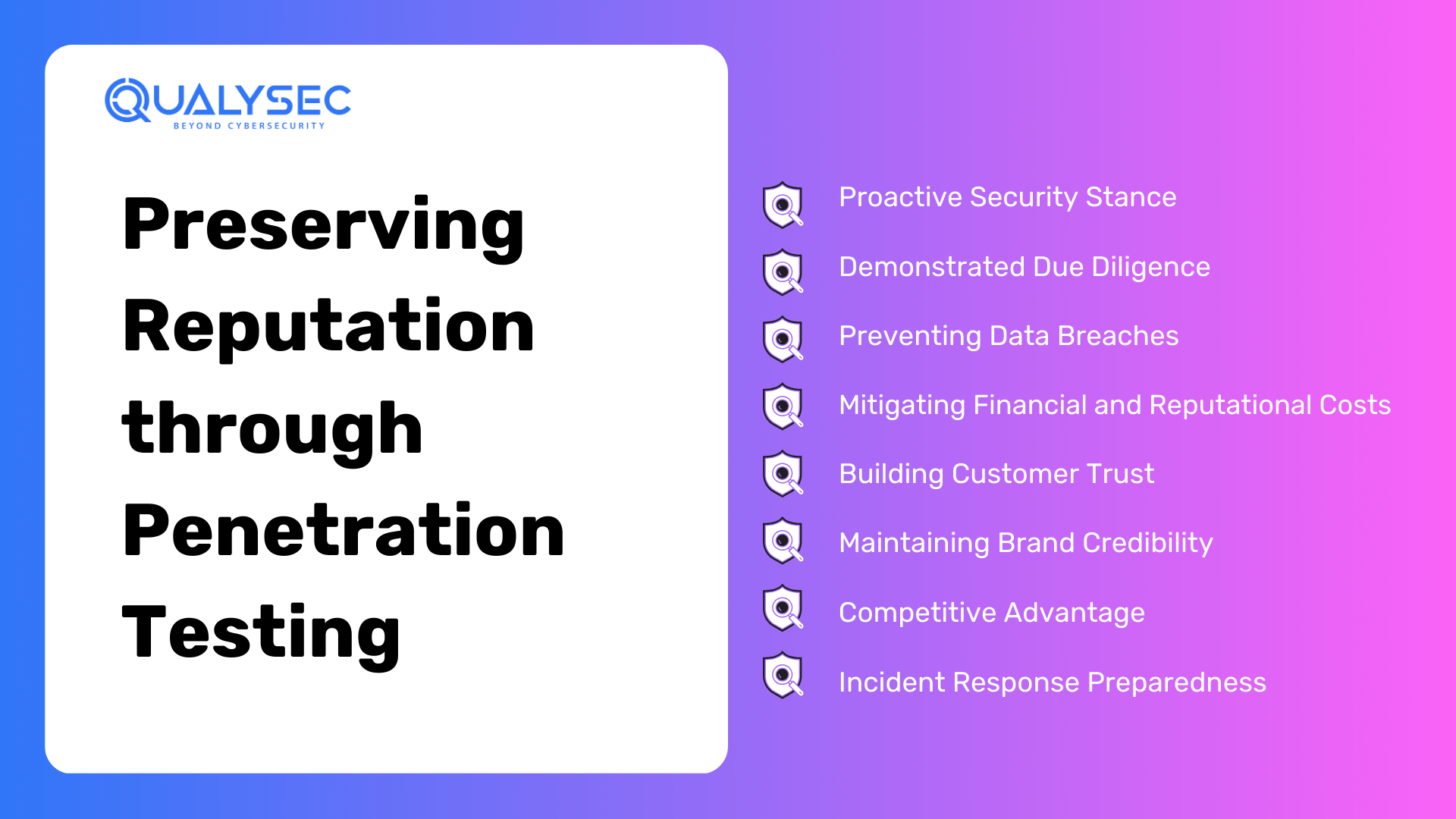
Proactive Security Stance:
- Penetration testing is a proactive approach to cybersecurity. It involves ethical hackers or security experts actively testing an organization’s systems, networks, and applications to identify vulnerabilities. This proactive stance sends a clear message that your organization takes the security of sensitive data seriously and is committed to safeguarding its reputation.
Demonstrated Due Diligence:
- Engaging in penetration testing showcases a high level of due diligence. It communicates that your organization is actively taking measures to identify and address security vulnerabilities before they can be exploited. This commitment to cybersecurity resonates positively with customers, partners, and stakeholders.
Preventing Data Breaches:
- Data breaches are one of the most damaging events for an organization’s reputation. They can lead to the exposure of sensitive customer information, eroding trust and confidence. Penetration testing helps prevent data breaches by identifying vulnerabilities that could be exploited to gain unauthorized access to sensitive data.
Mitigating Financial and Reputational Costs:
- In the event of a data breach or security incident, an organization not only incurs financial losses but also faces reputational damage. Penetration testing helps mitigate these costs by preventing incidents in the first place. This proactive approach safeguards the organization’s financial health and reputation.
Building Customer Trust:
- Customers place their trust in organizations to protect their data. When customers know that an organization regularly conducts penetration testing to assess and enhance its cybersecurity measures, it builds trust. Trust is a cornerstone of a positive reputation, and customers are more likely to continue doing business with organizations they trust.
Maintaining Brand Credibility:
- A strong reputation contributes to brand credibility. Organizations that are viewed as trustworthy and security-conscious are seen as credible partners and service providers. This credibility attracts customers, partners, and stakeholders and enhances the organization’s competitive position.
Competitive Advantage:
- In a competitive marketplace, organizations that actively demonstrate their commitment to cybersecurity through practices like penetration testing gain a competitive advantage. They stand out as secure and responsible partners, attracting potential customers and partners away from less security-conscious competitors.
Incident Response Preparedness:
- In the unfortunate event of a security incident, organizations that have undergone penetration testing are better prepared to respond effectively. This readiness is reassuring to stakeholders, as they know that you have a plan in place to mitigate the impact of such incidents, reducing reputational damage.
Conclusion
Absolutely, your conclusion effectively encapsulates the importance of penetration testing in the modern cybersecurity landscape. It highlights how this proactive strategy can be a game-changer for organizations in safeguarding their digital assets, reputation, and trustworthiness. Embracing penetration testing as a fundamental element of your cybersecurity strategy indeed fortifies your defenses and helps you stay ahead of cyber adversaries. Well-summarized!
Qualysec has a successful track record of serving clients and providing cybersecurity services across a range of industries such as IT. Their expertise has helped clients identify and mitigate vulnerabilities, prevent data breaches, and improve their overall security posture.
When it comes to comprehensive cybersecurity audits, Qualysec is the organization to go with. Their cost of VAPT guide helps clients make informed decisions by understanding the various factors that affect the cost by clicking here.
Talk to our Cybersecurity Expert to discuss your specific needs and how we can help your business.
FAQs
Q: What is the primary goal of penetration testing?
The primary goal of penetration testing is to systematically identify and address vulnerabilities within an organization’s digital infrastructure and applications. By doing so, it aims to enhance the overall cybersecurity posture of the organization. Penetration testers, often referred to as ethical hackers, simulate real-world cyberattacks to uncover weaknesses before malicious actors can exploit them. The ultimate objective is to reduce the risk of security breaches and data compromises.
Q: How often should an organization conduct penetration testing?
The frequency of penetration testing can vary based on several factors, including the organization’s size, industry, and the evolving threat landscape. However, as a general guideline, it is advisable to conduct penetration tests at least annually. Additionally, organizations should consider conducting tests after significant changes to their infrastructure, applications, or security policies. Regular testing ensures that vulnerabilities are continually addressed and that the organization’s security measures remain effective in the face of emerging threats.
Q: Are there different types of penetration testing?
Yes, there are different types of penetration testing, each tailored to specific security assessment objectives. These include:
- Black-Box Testing: In this approach, testers have limited or no prior knowledge of the organization’s systems and applications. It simulates how an external attacker with no insider information would attempt to compromise the organization’s security.
- White-Box Testing: Testers have comprehensive knowledge of the organization’s systems, including architecture and source code. This approach allows for in-depth assessment and is often used to identify vulnerabilities at a deeper level.
- Grey-Box Testing: This approach falls between black-box and white-box testing. Testers have some knowledge of the organization’s systems, typically focusing on specific areas or aspects while maintaining a degree of realistic uncertainty.
Q: Can penetration testing guarantee 100% security?
No, penetration testing cannot guarantee absolute security. It is an essential component of a comprehensive cybersecurity strategy, but it should be viewed as one layer of defense. Cybersecurity is an ongoing process, and new vulnerabilities may emerge over time. Penetration testing helps reduce known risks and vulnerabilities, but it cannot eliminate the possibility of undiscovered threats or zero-day vulnerabilities. Therefore, organizations should combine penetration testing with other security measures, such as regular patching, user training, and threat monitoring, to achieve a more holistic security posture.
Q: Is penetration testing only for large organizations?
No, penetration testing is beneficial for organizations of all sizes. In fact, cybercriminals often target smaller businesses precisely because they may lack robust security measures. Penetration testing can be scaled to fit the specific needs and resources of smaller organizations.
Q: How can I choose the right penetration testing service provider?
Selecting the right penetration testing service provider is critical for obtaining meaningful results. Here are some key factors to consider:
- Experience and Expertise: Look for a provider with a proven track record and extensive experience in conducting penetration tests.
- Certifications: Ensure that the provider’s team holds relevant certifications, such as Certified Ethical Hacker (CEH), Certified Information Systems Security Professional (CISSP), or Offensive Security Certified Professional (OSCP).
- Industry Knowledge: Choose a provider that understands the specific cybersecurity challenges and compliance requirements relevant to your industry.
- References and Reviews: Seek references from past clients and read reviews or testimonials to gauge the provider’s reputation and reliability.
- Customization: The provider should tailor the penetration testing approach to your organization’s unique needs and concerns.
- Clear Reporting: Ensure that the provider delivers clear and actionable reports that detail vulnerabilities, their severity, and recommended remediation steps.









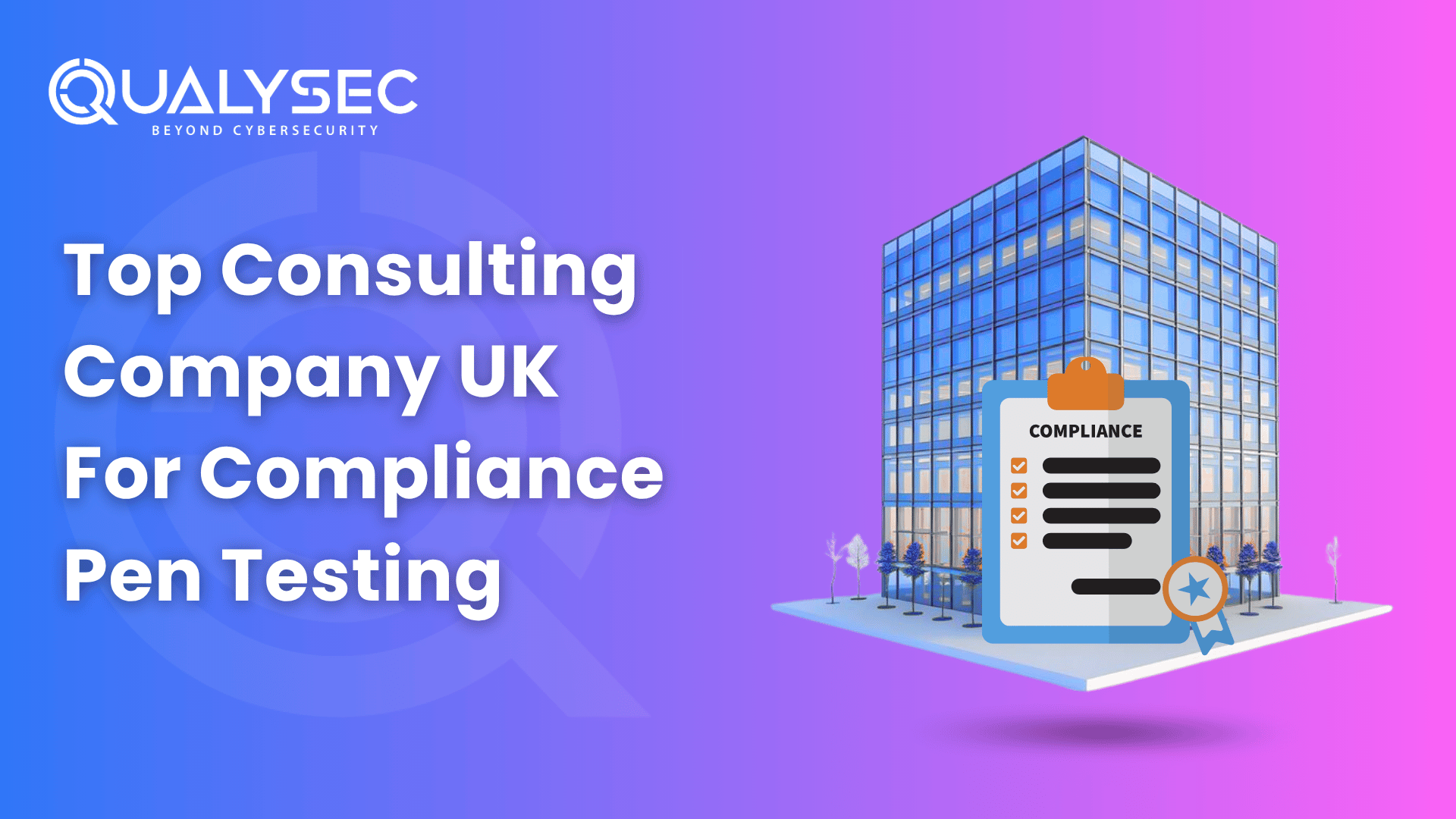
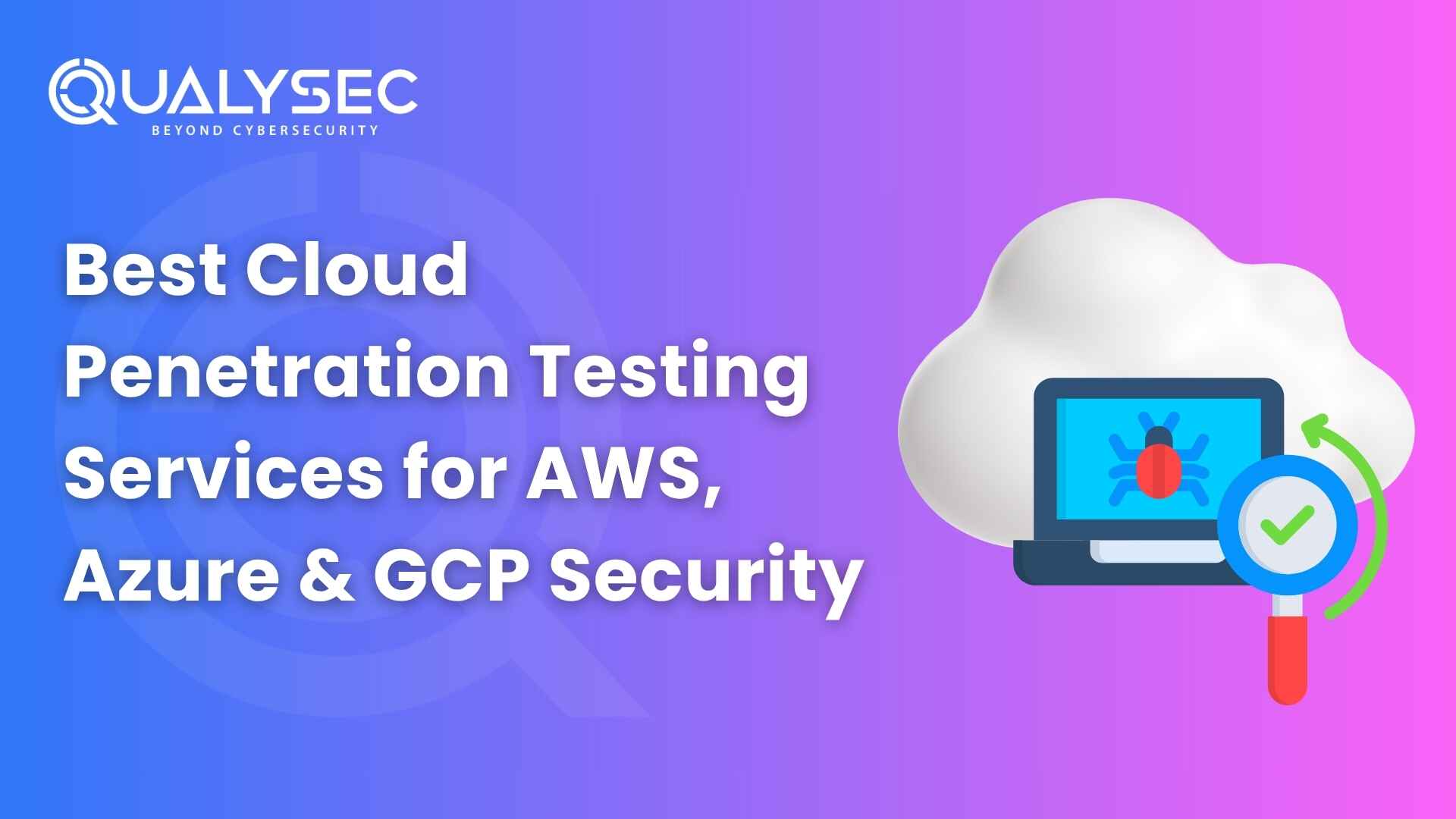
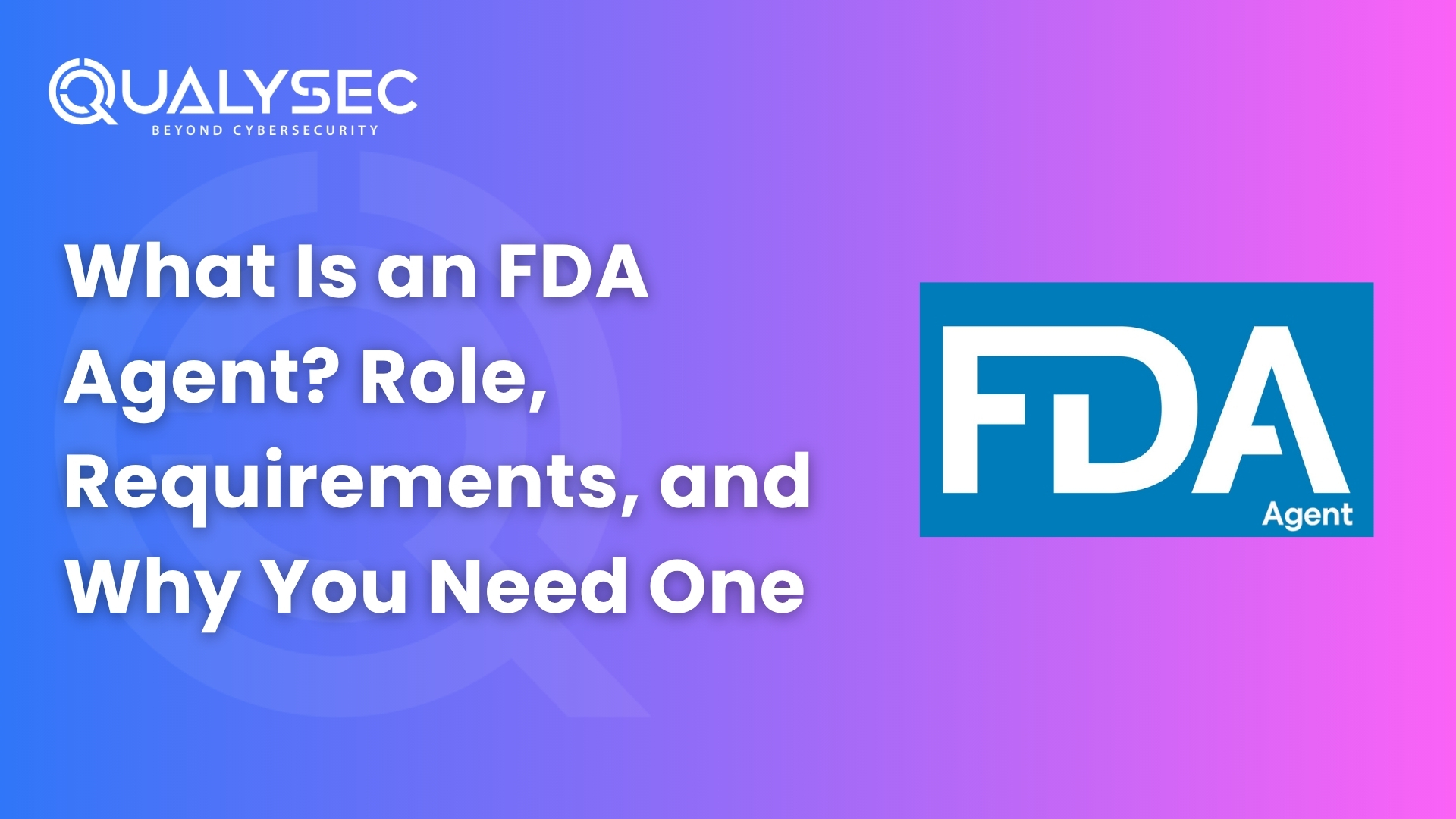
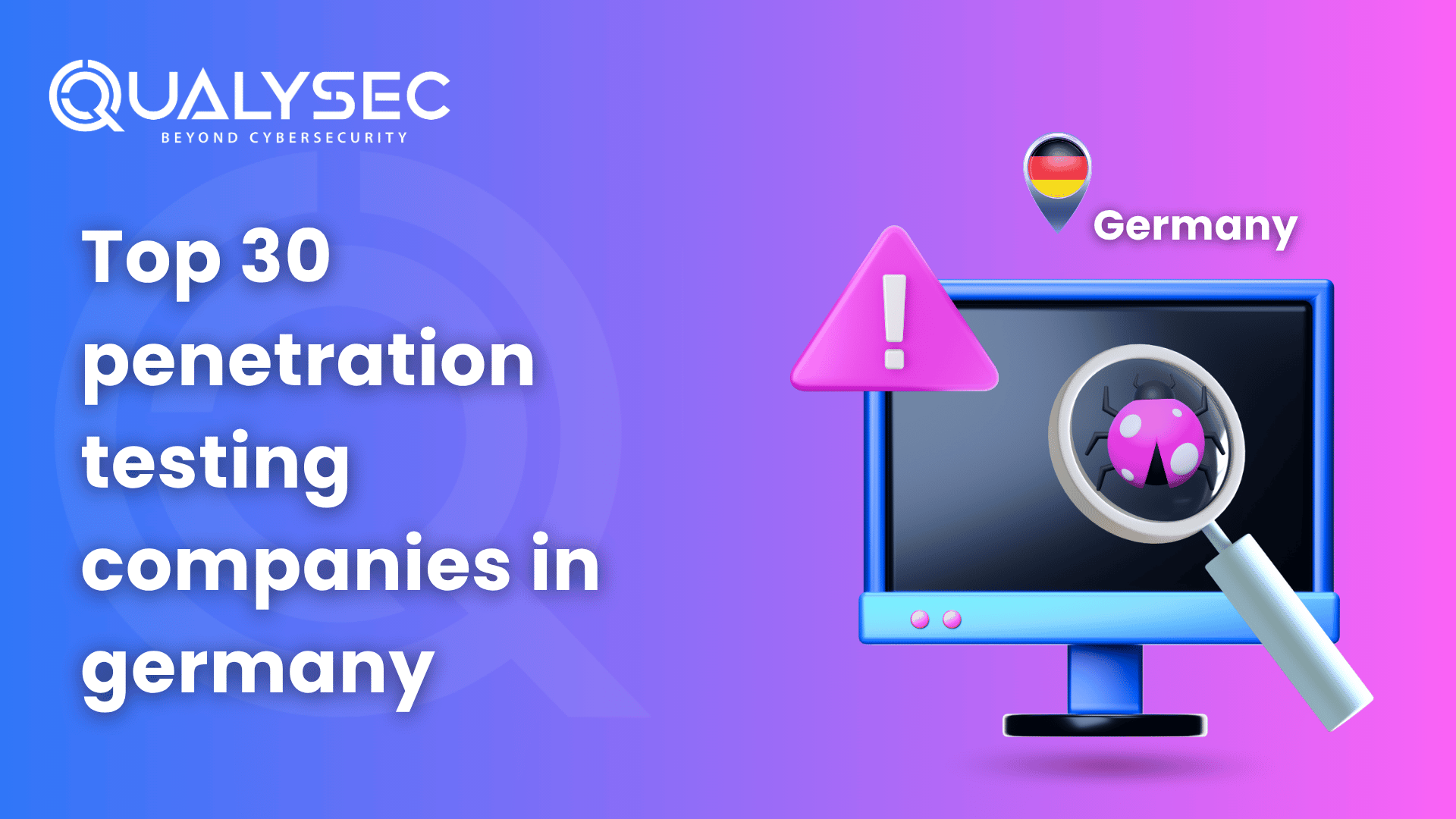



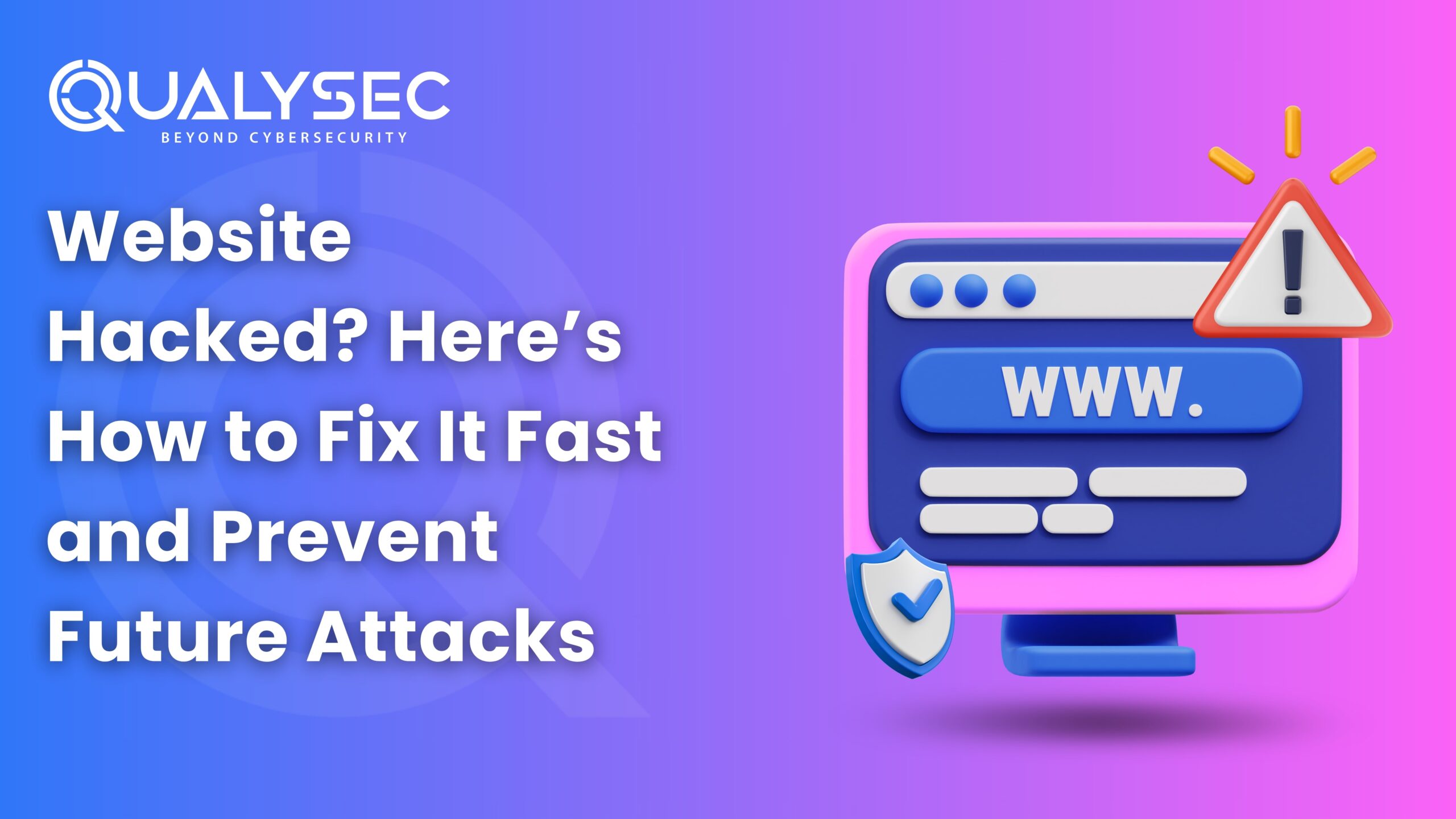

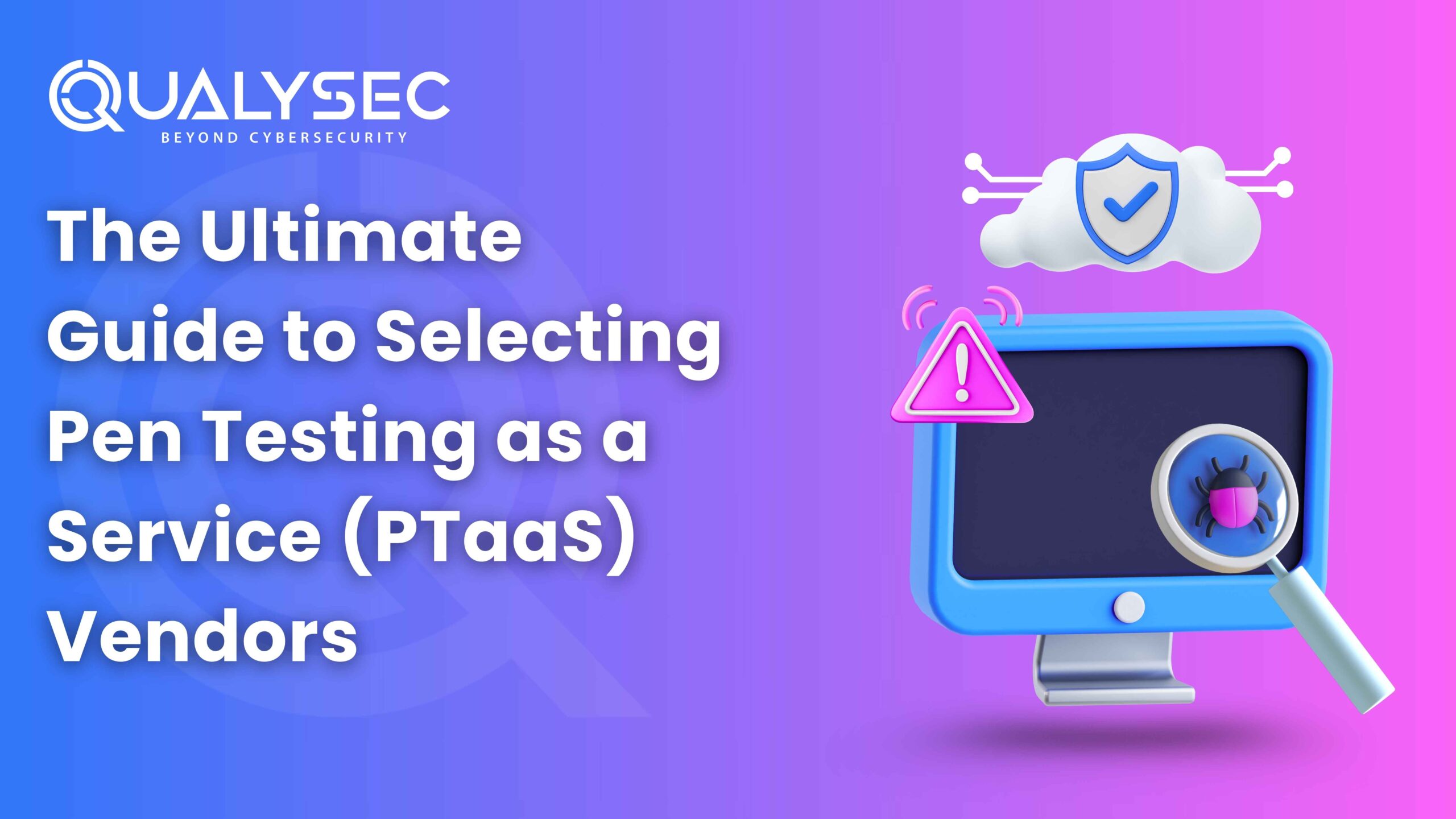

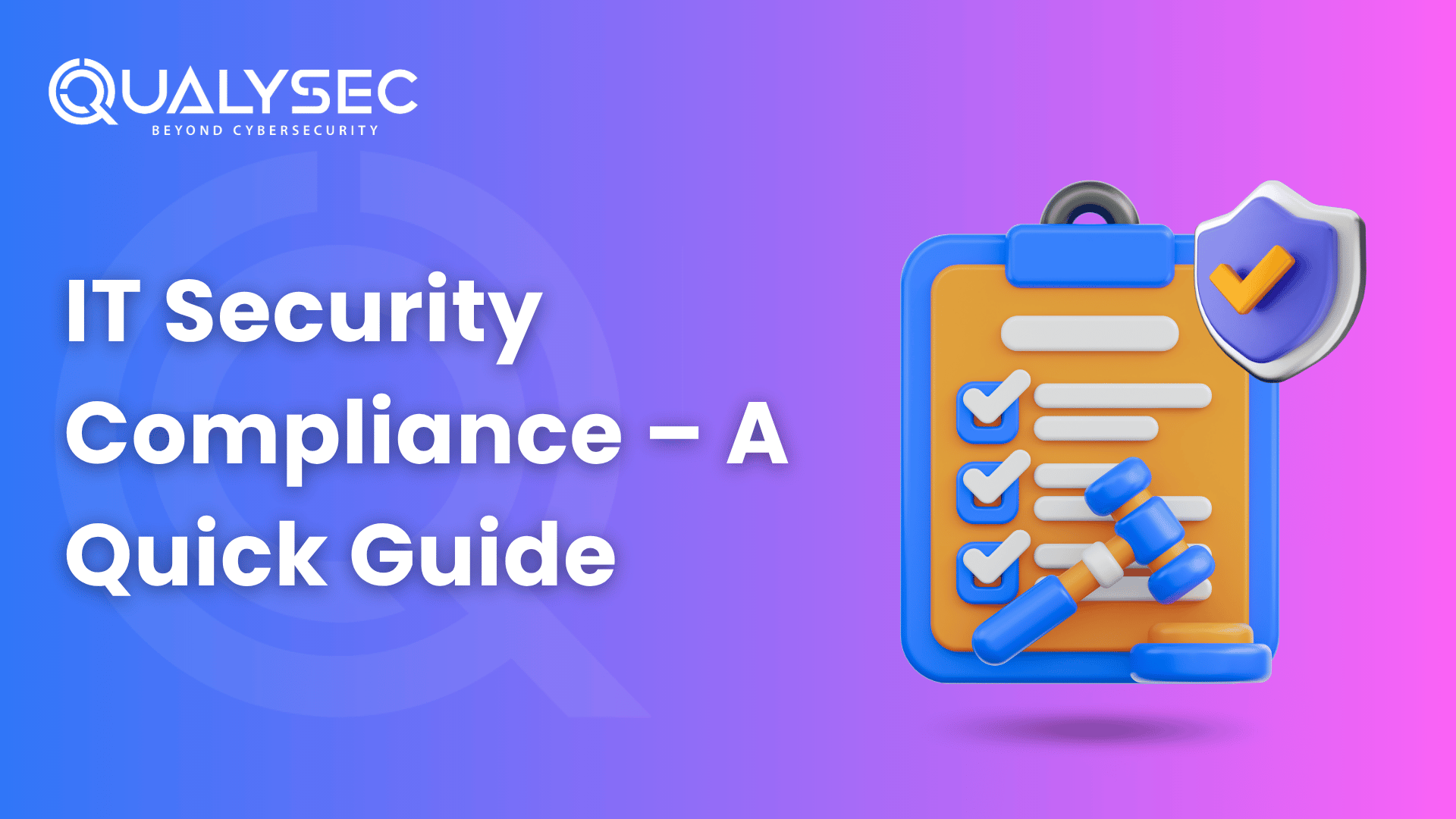
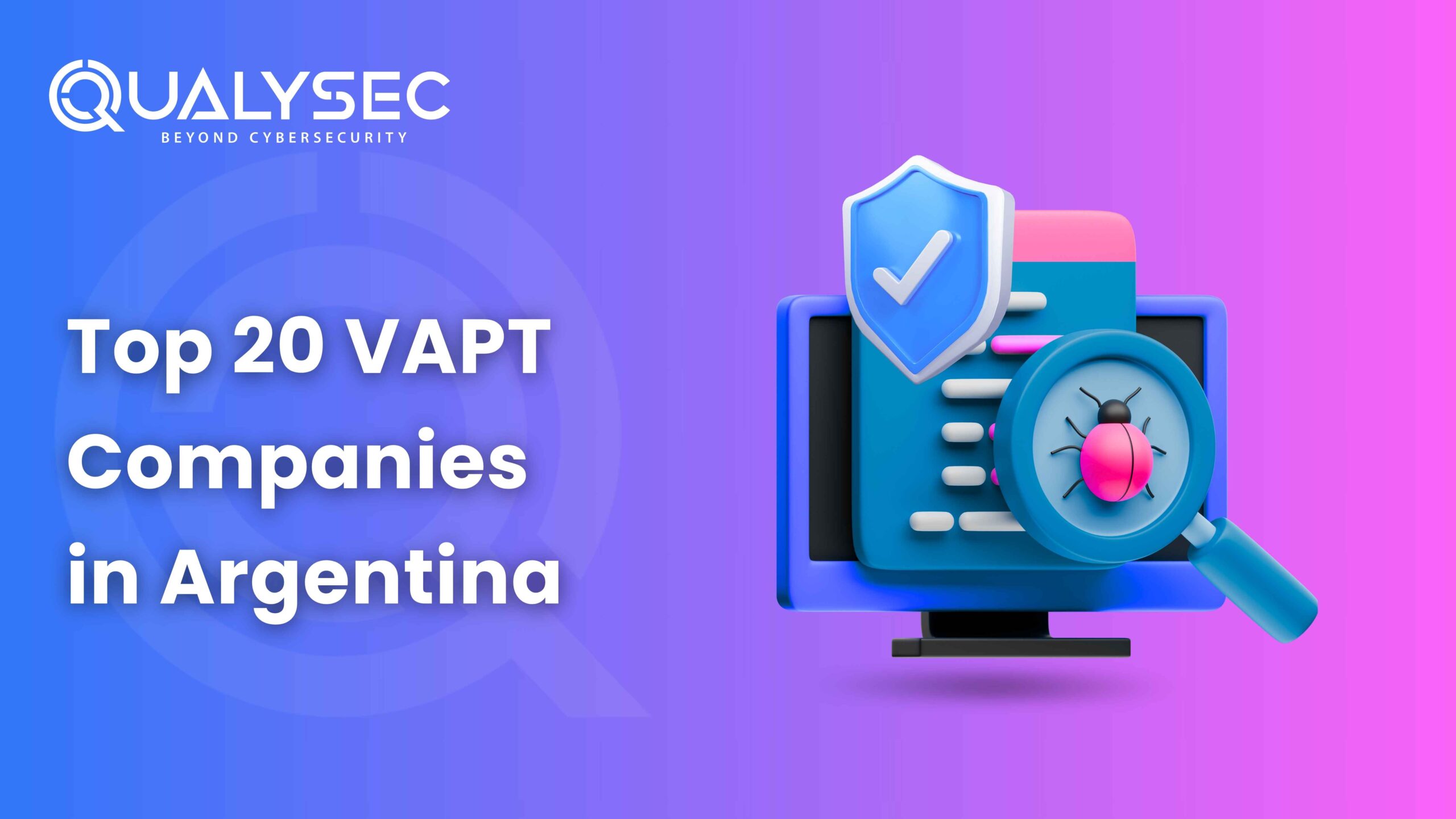
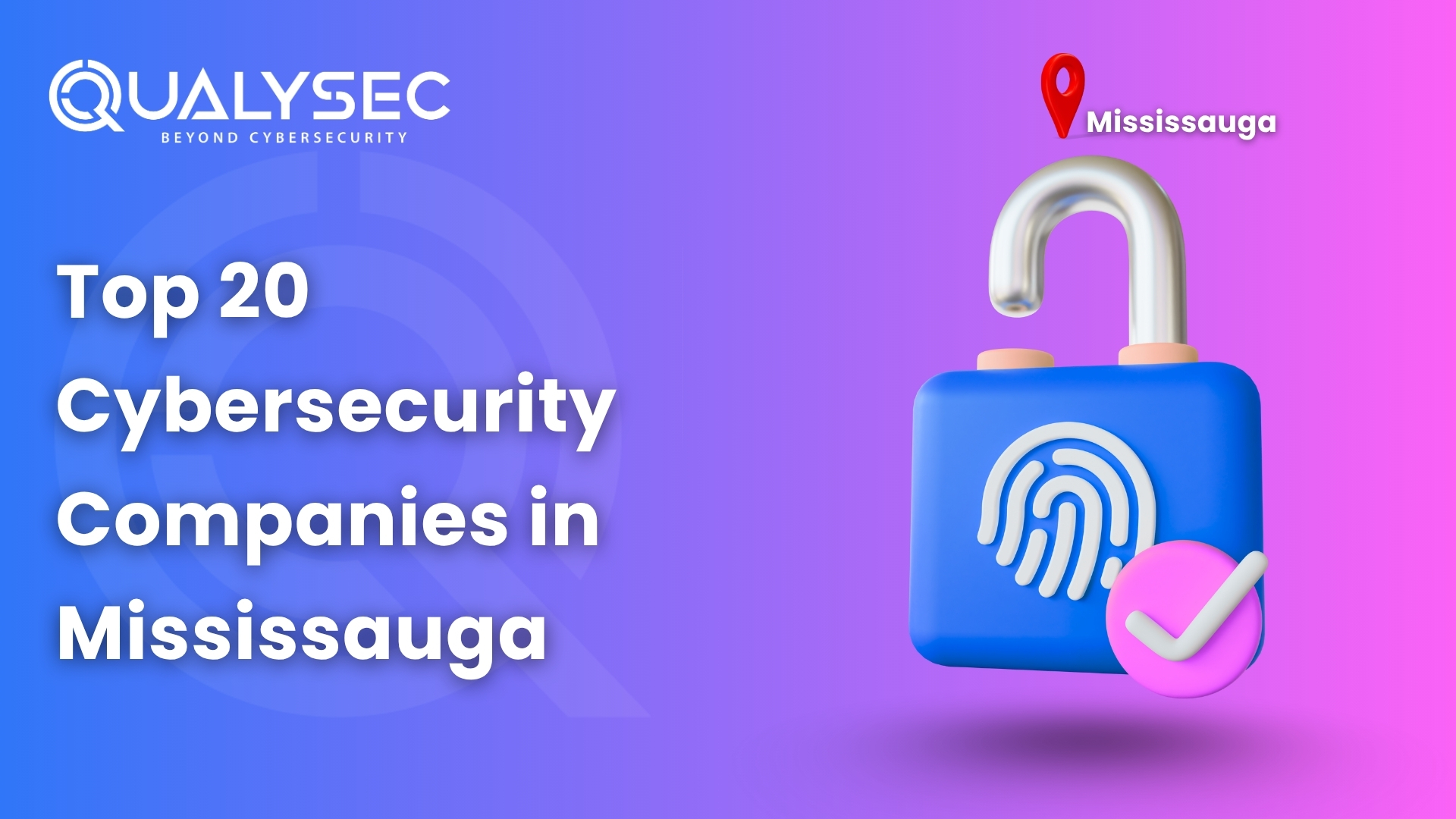




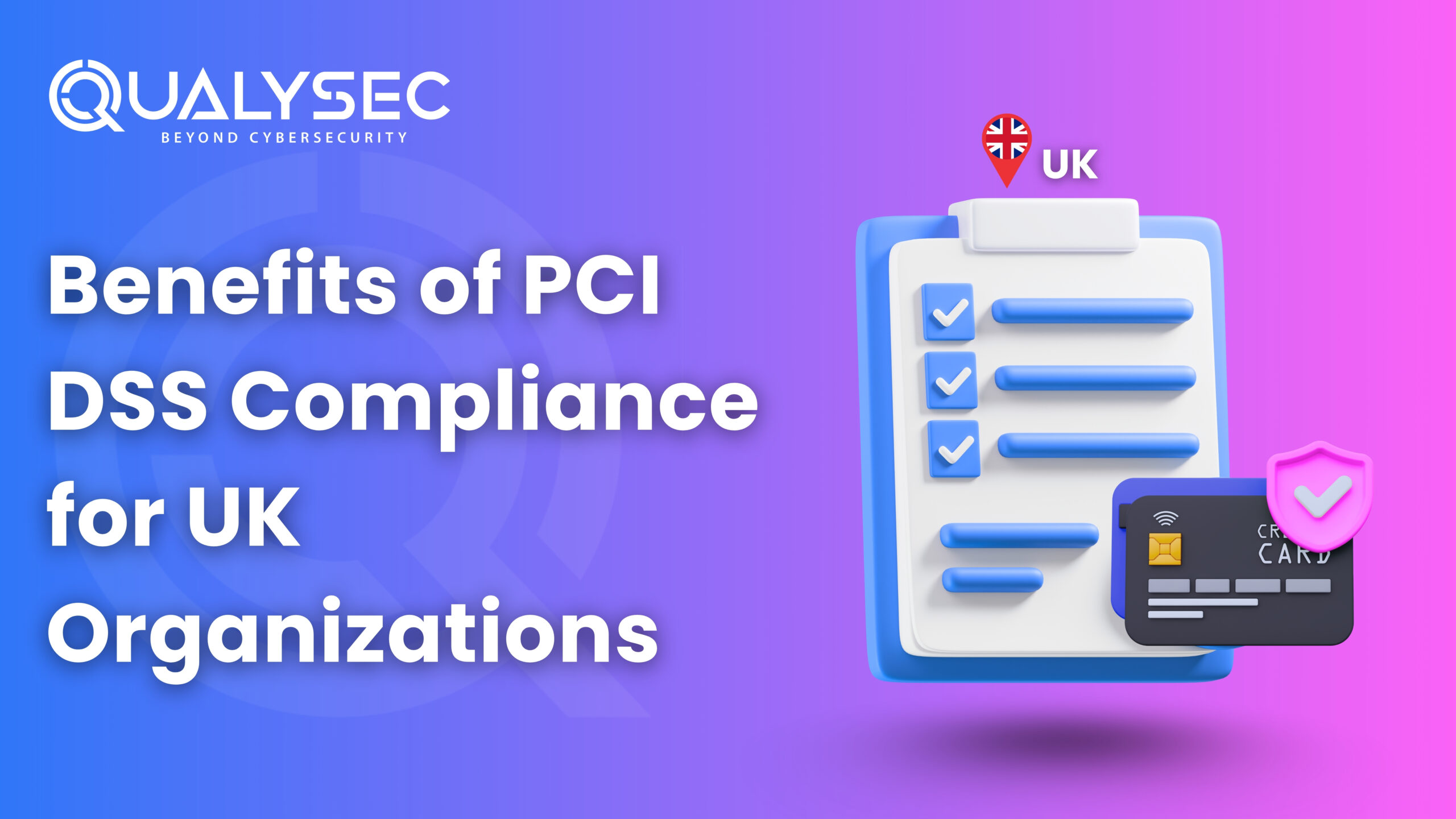




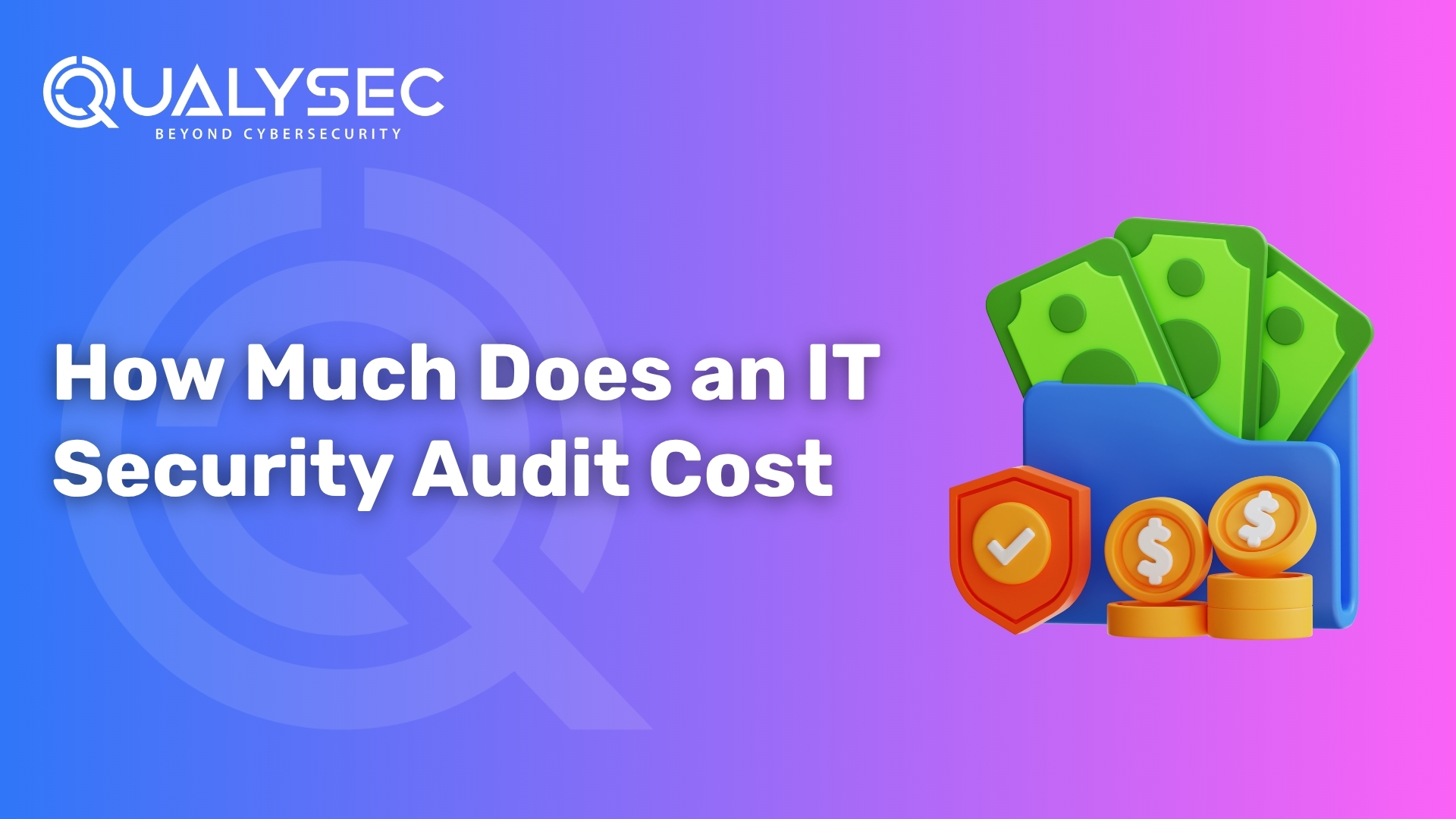

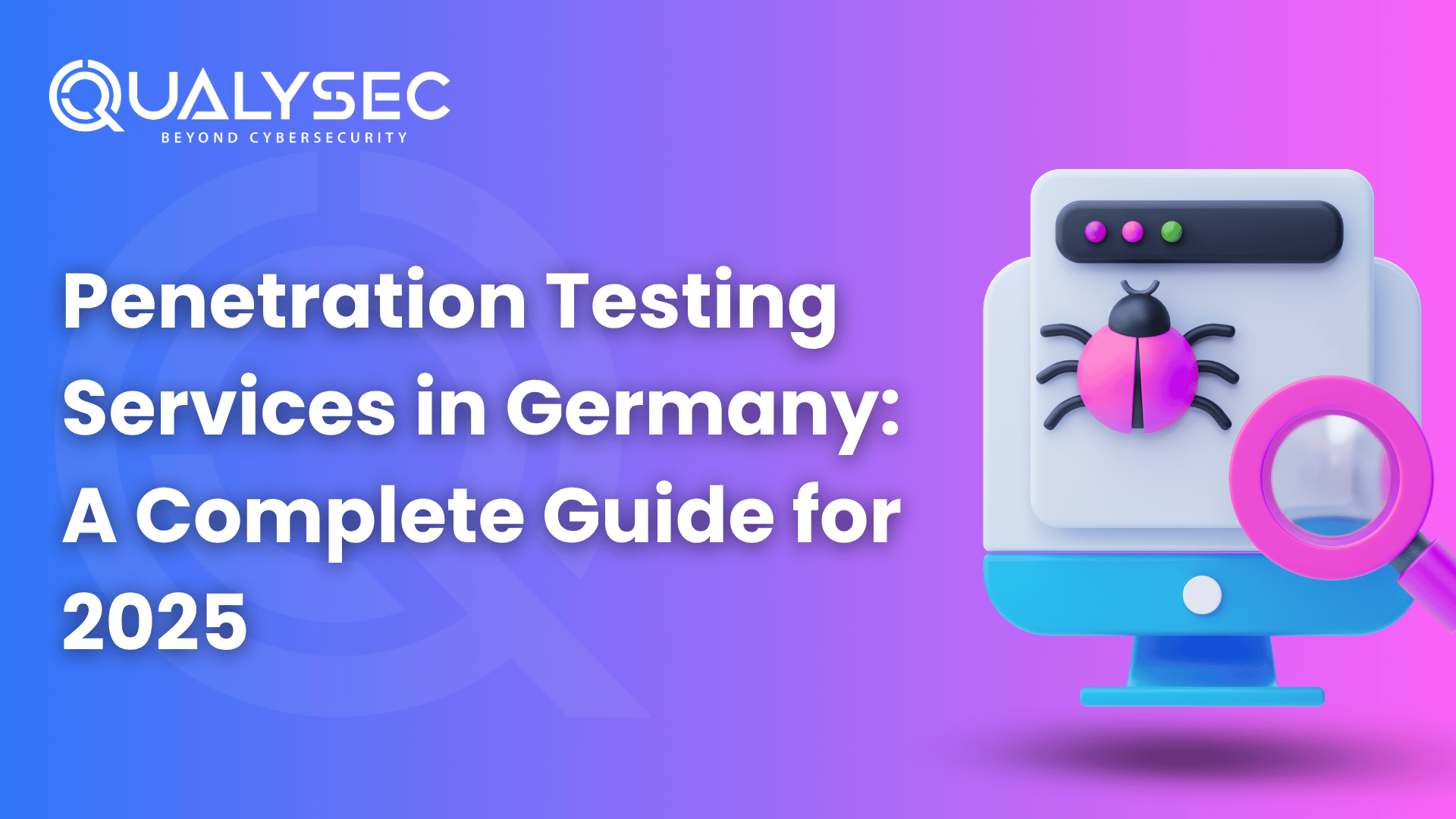
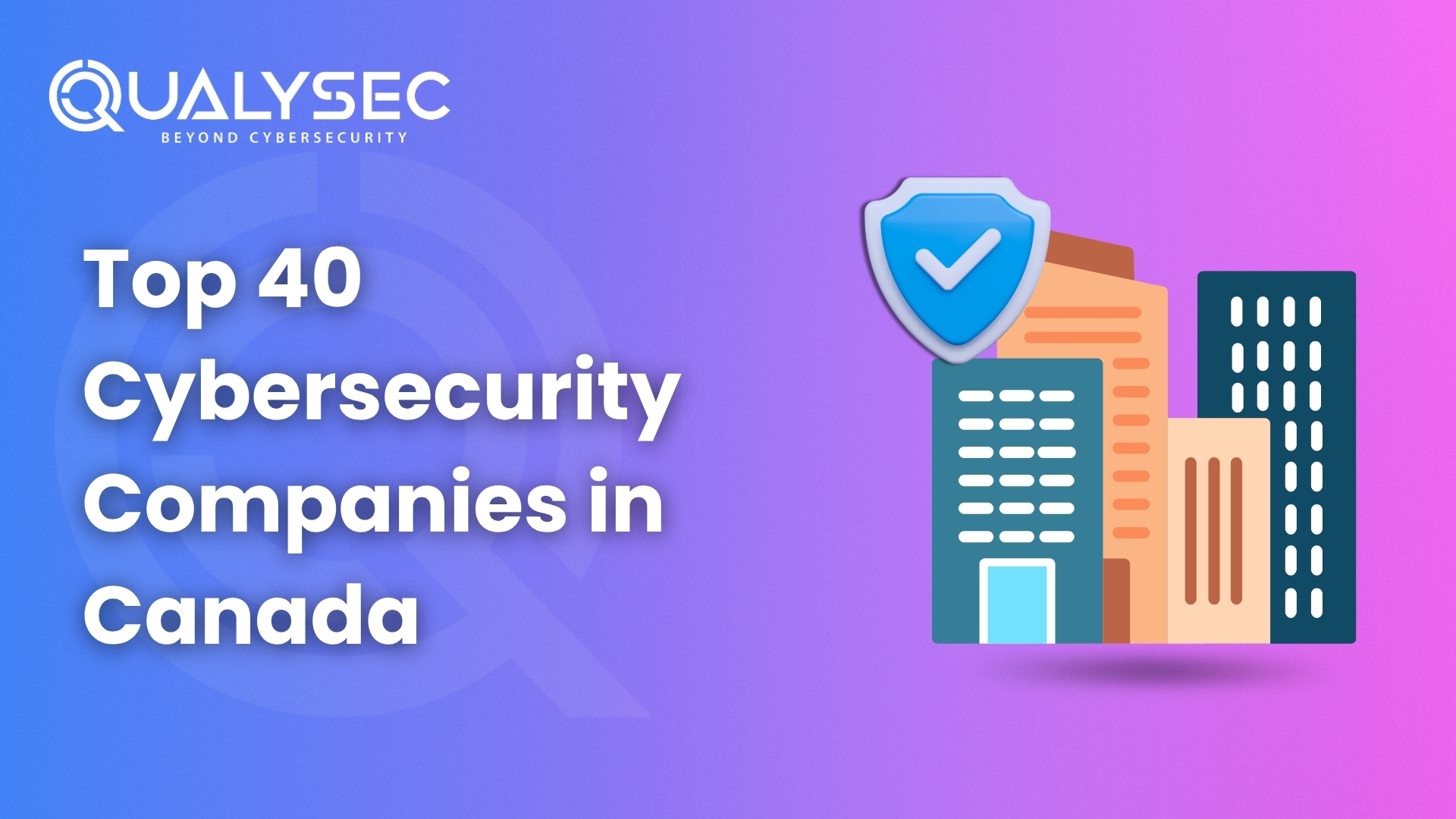


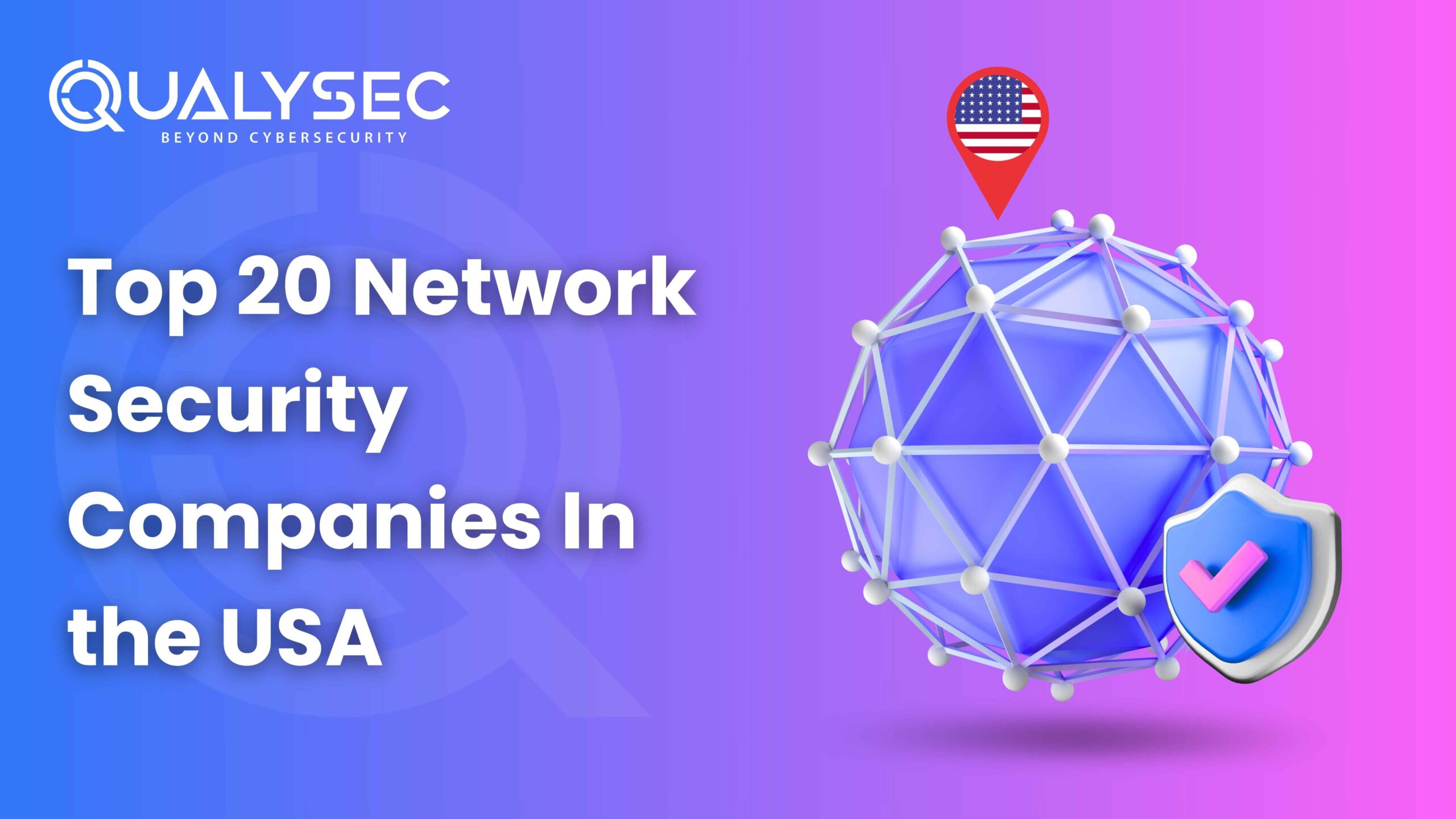

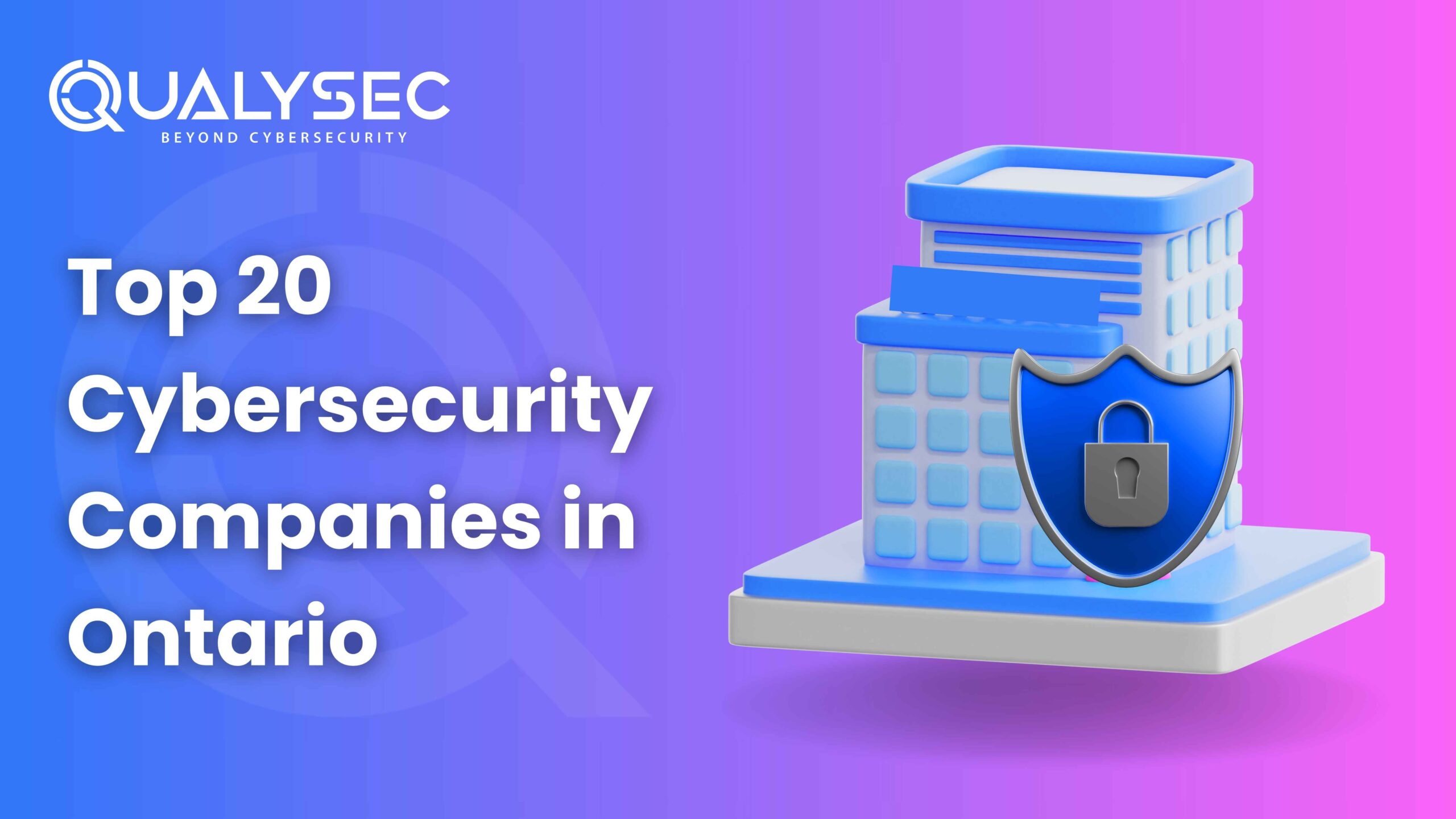

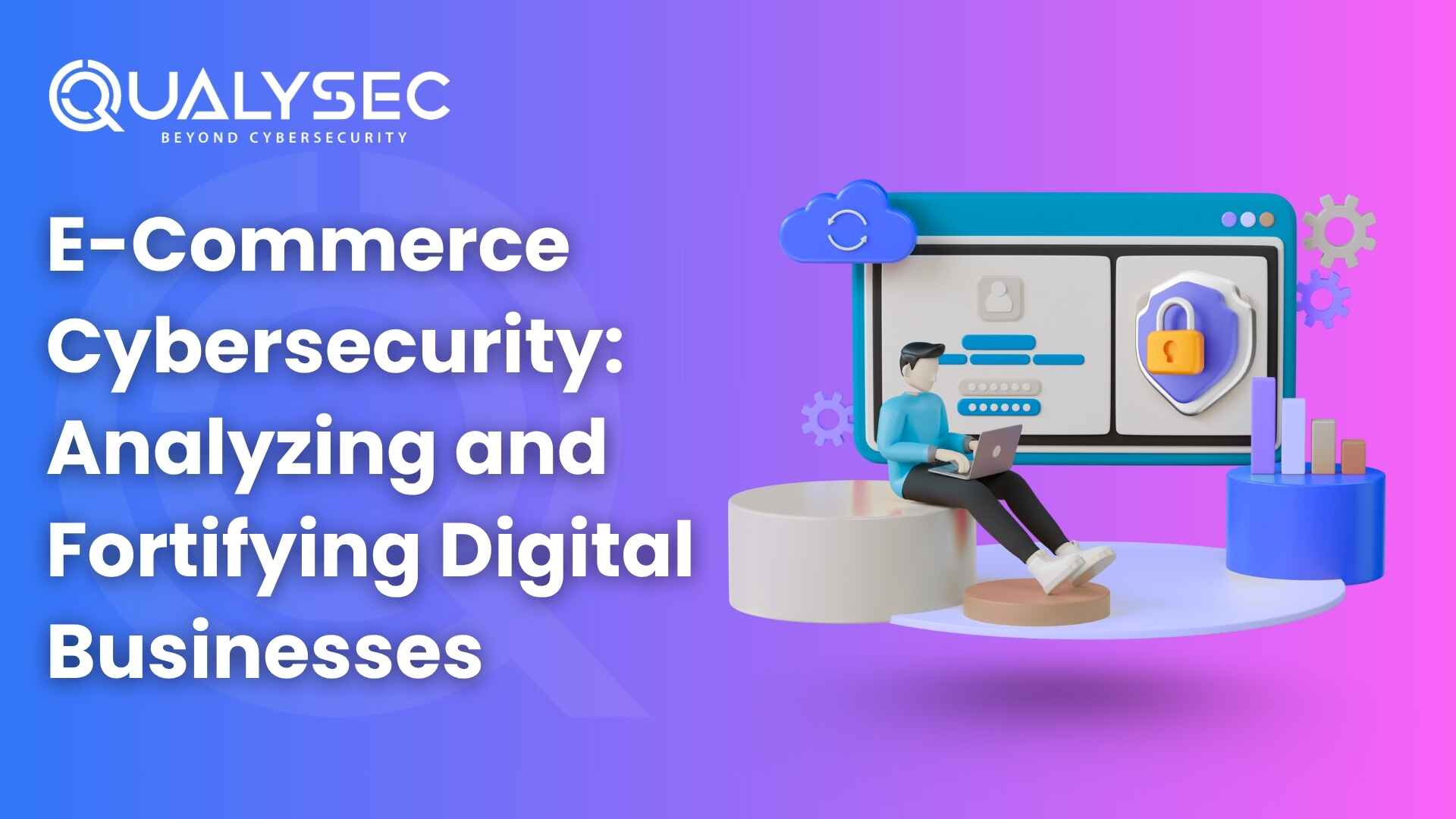
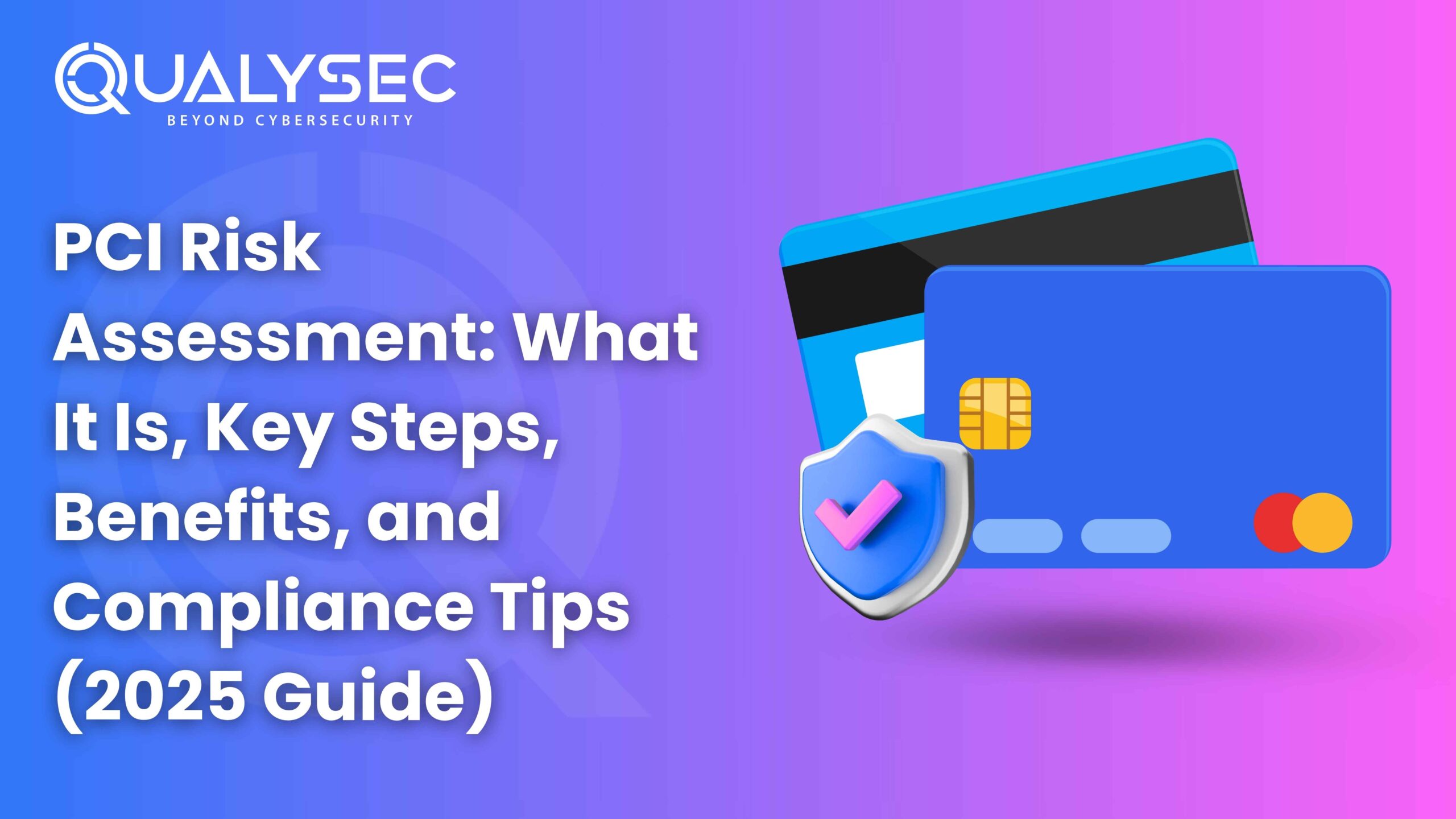






















































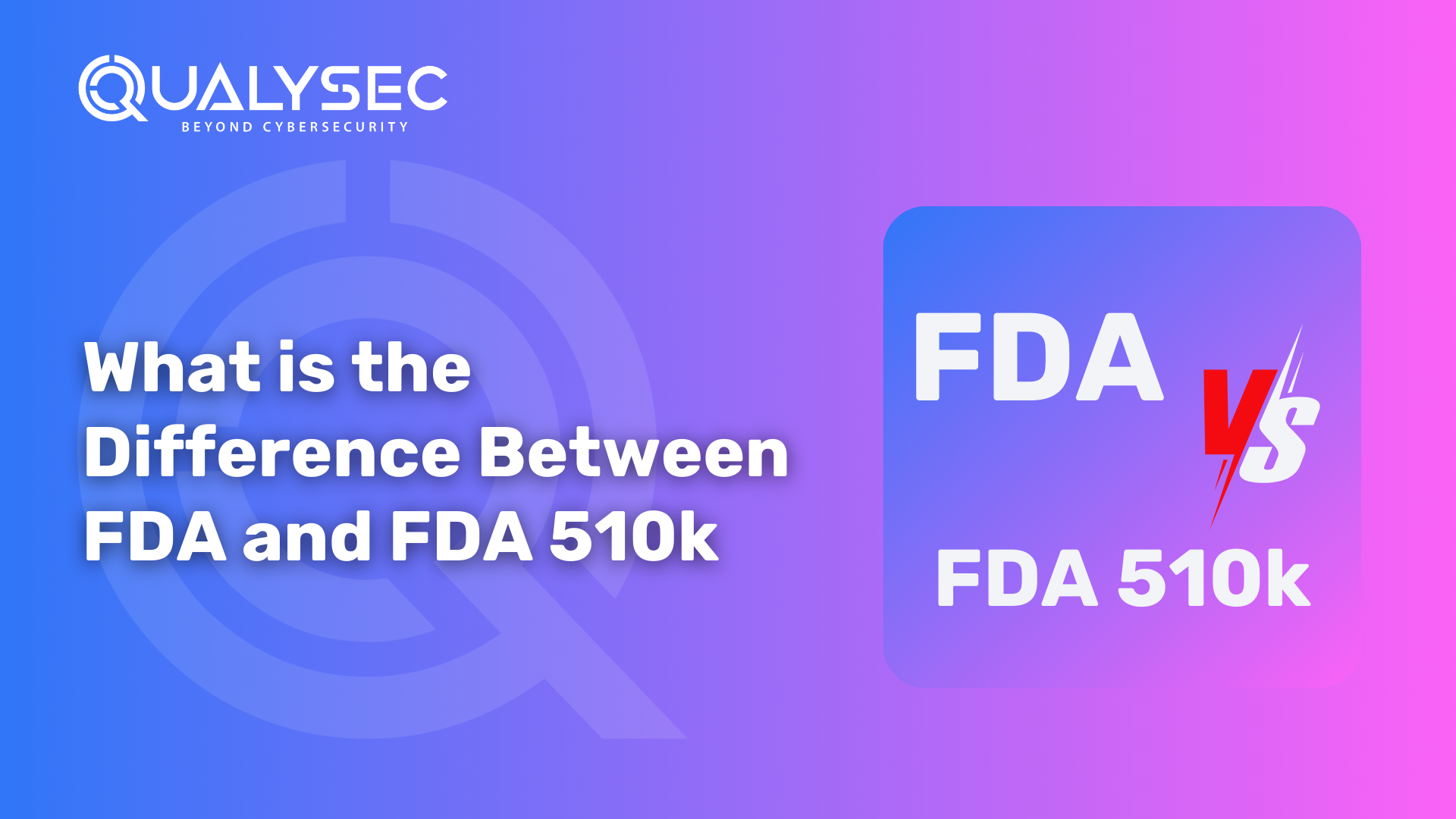


































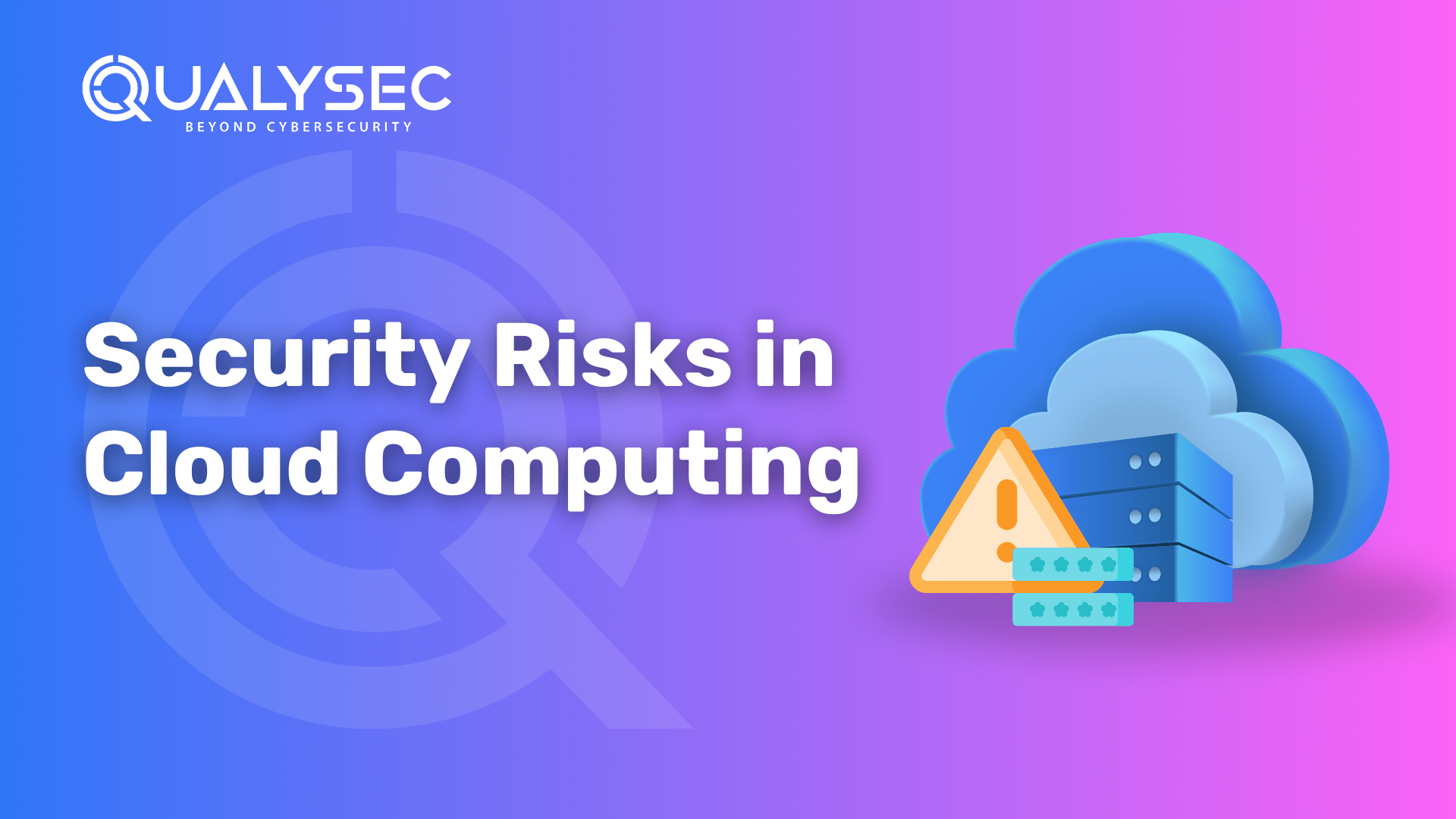







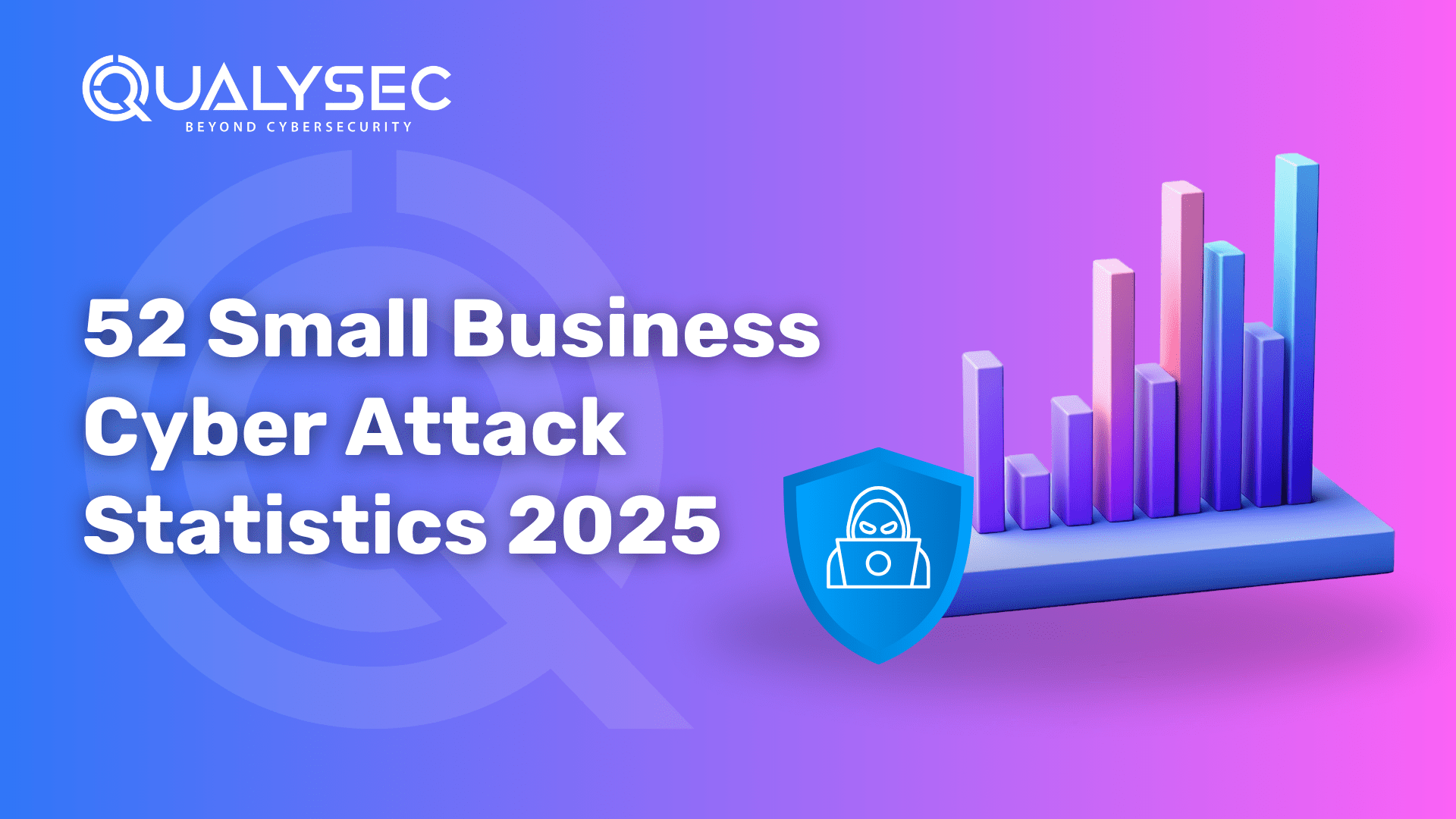


























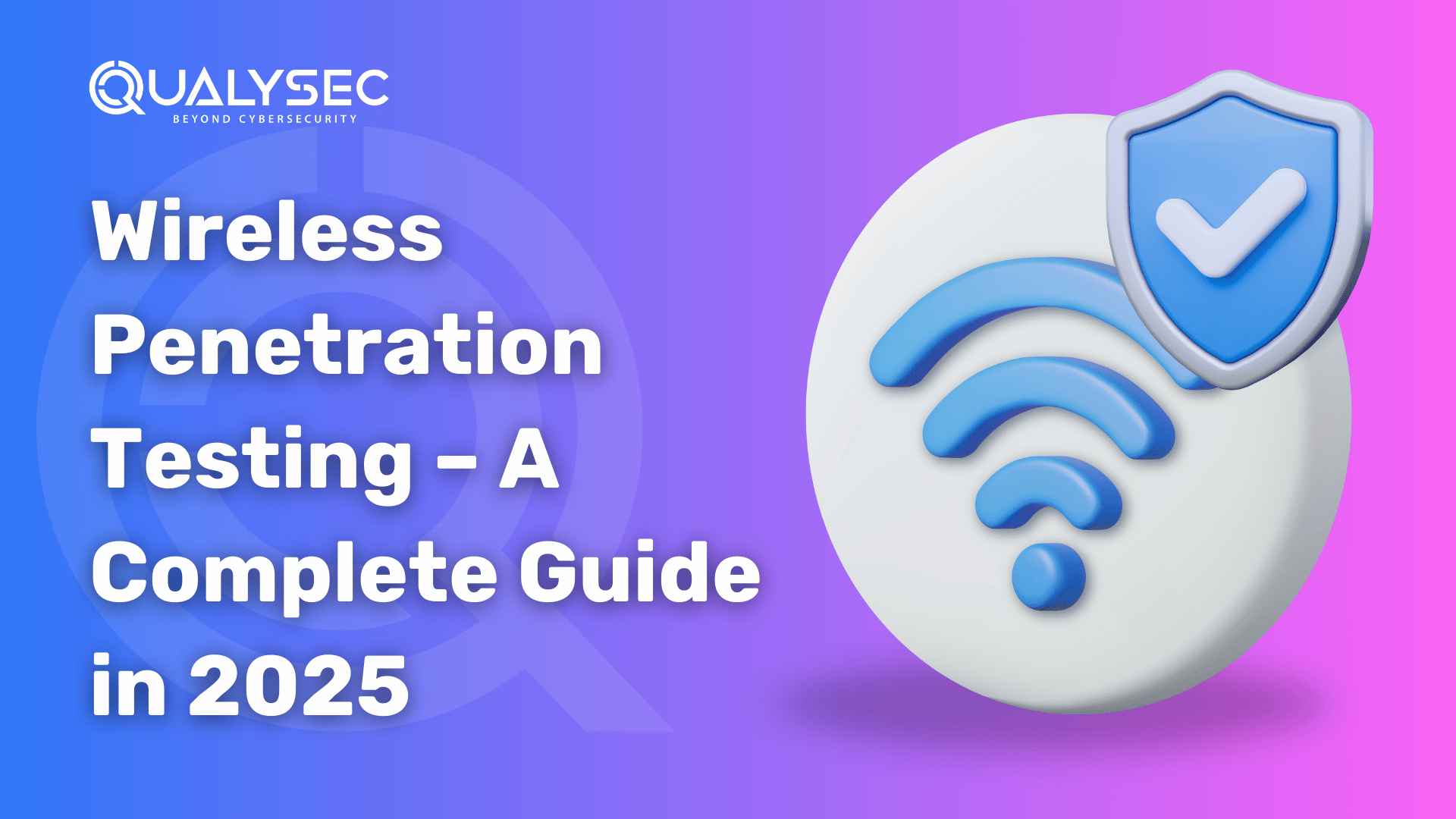































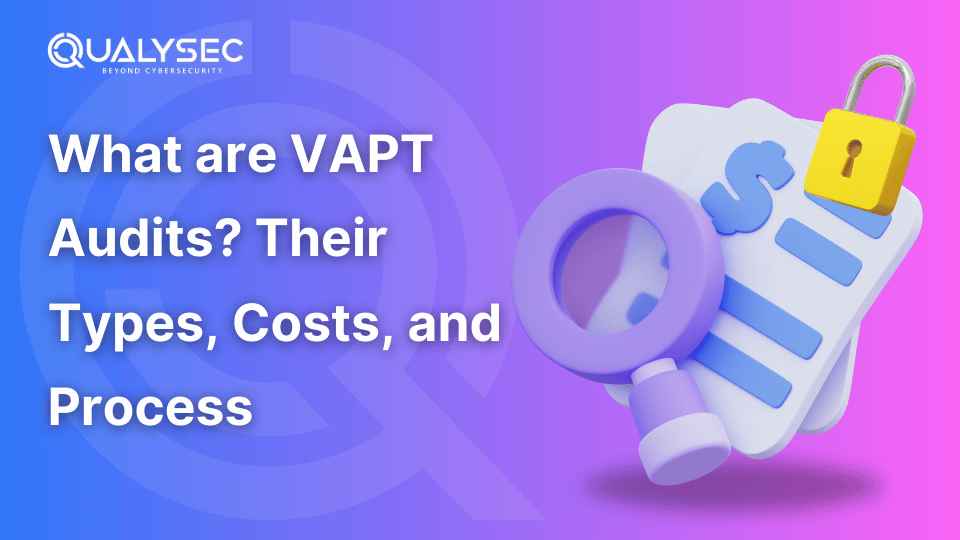








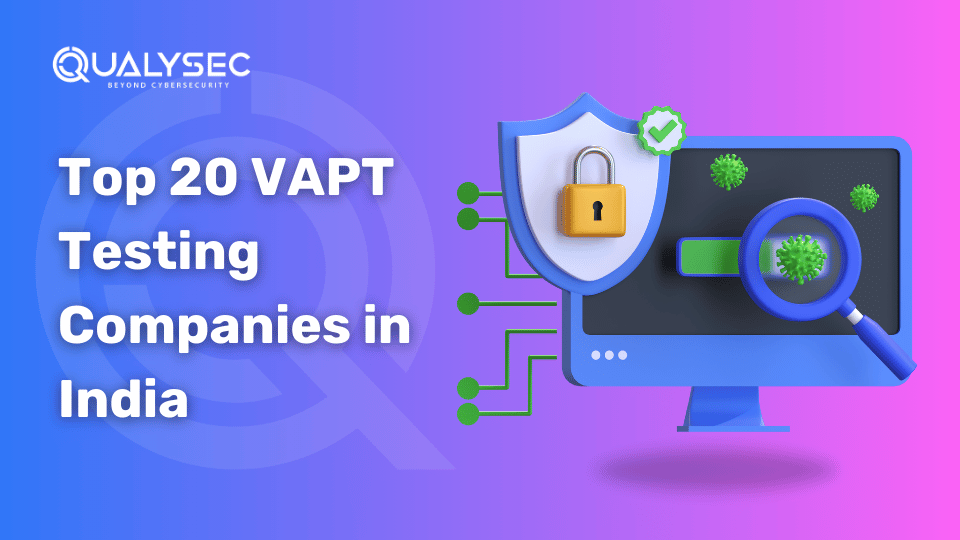


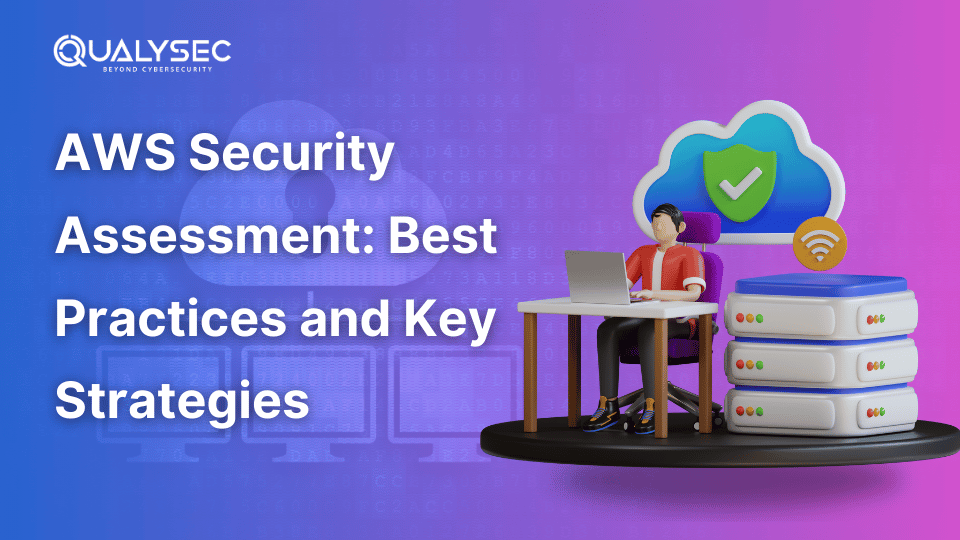




















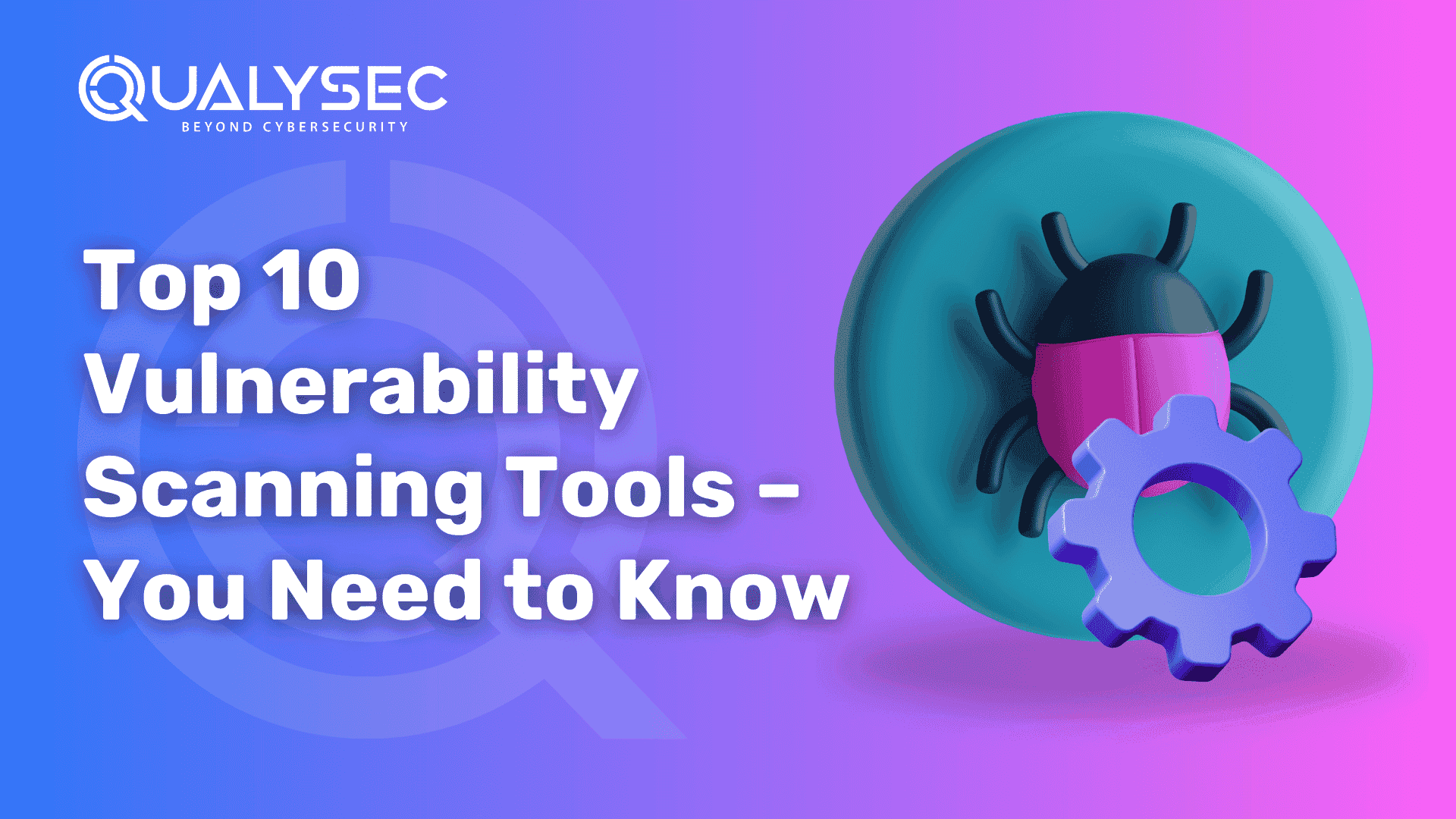



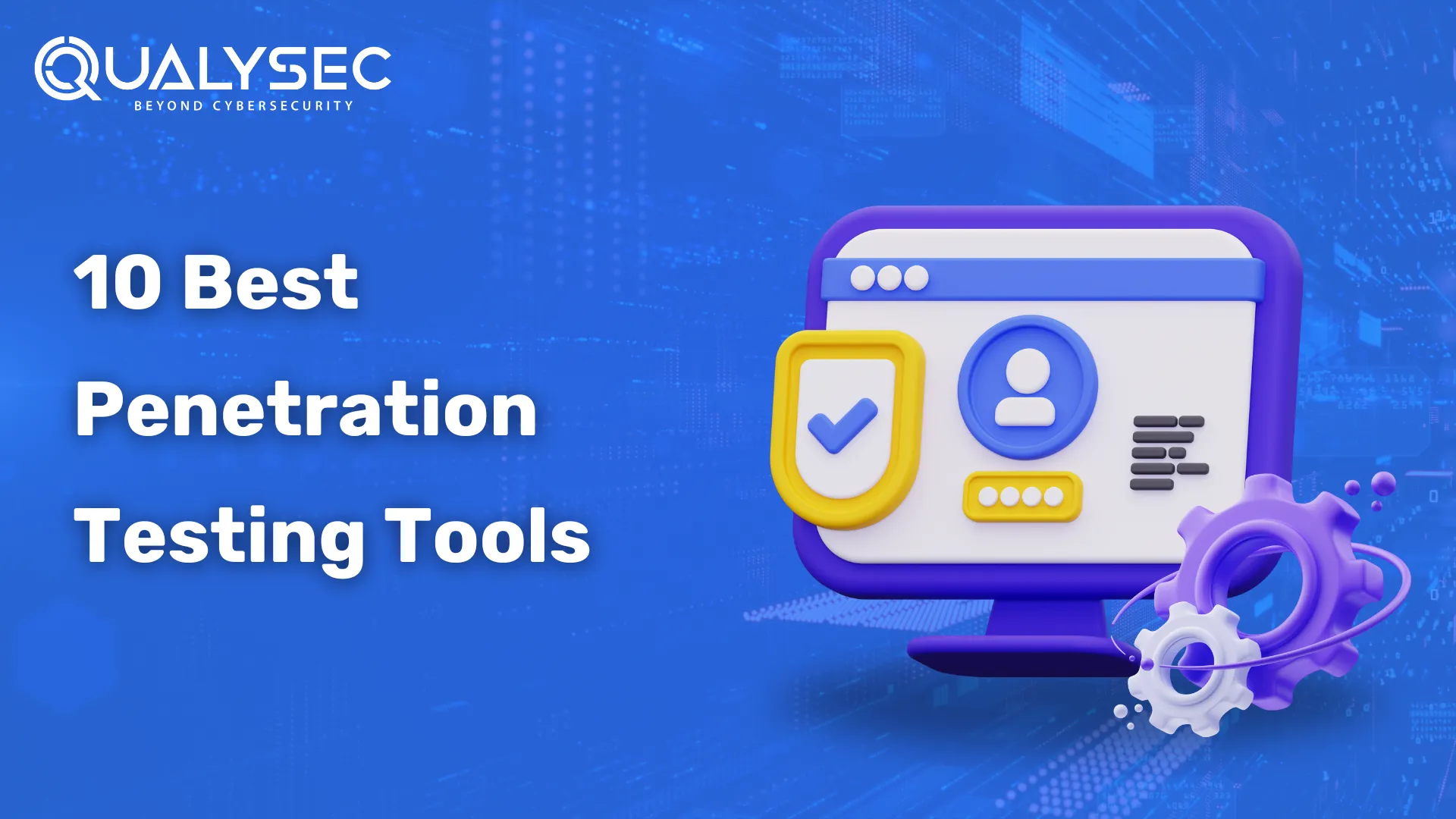












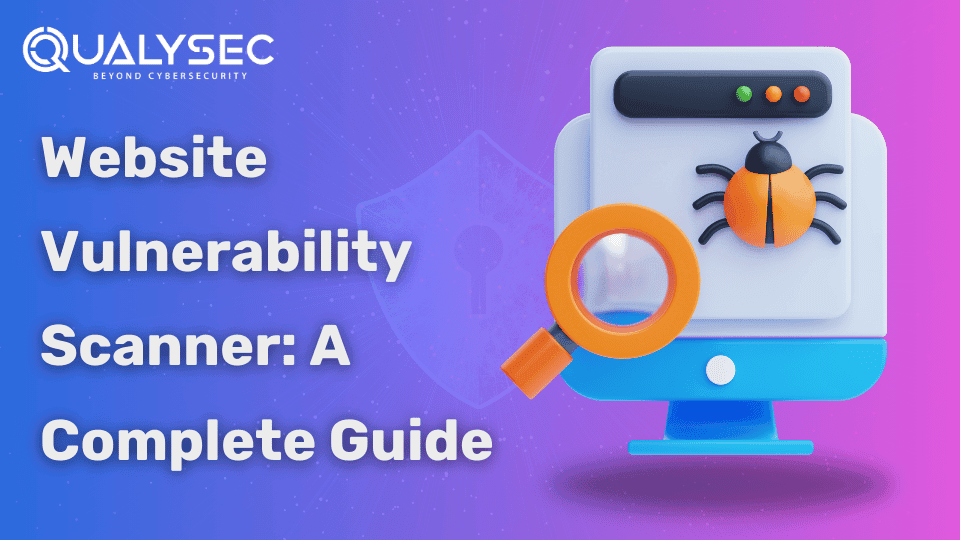

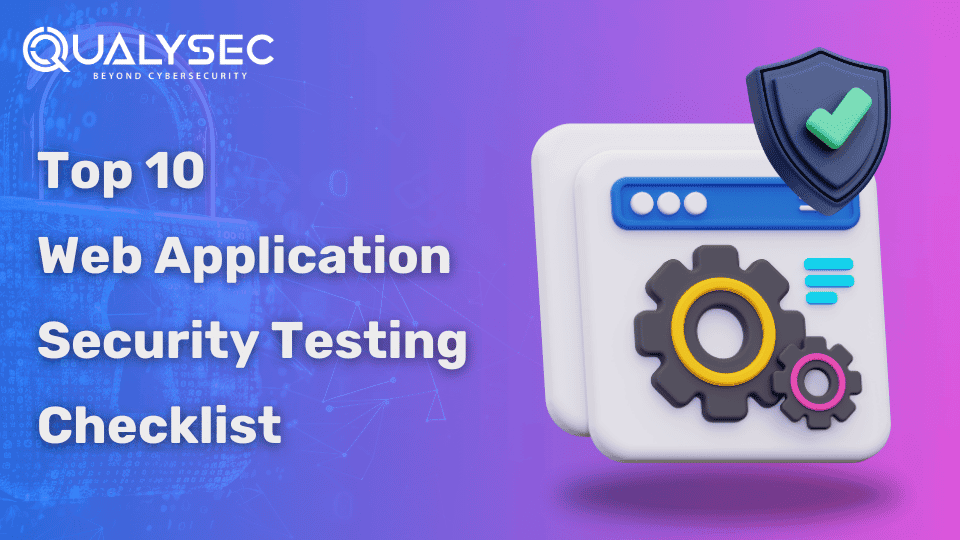

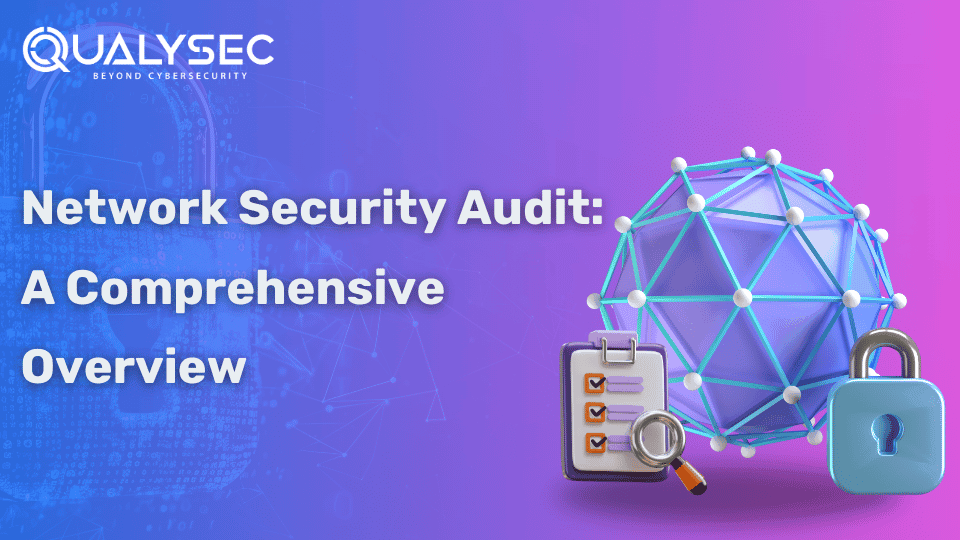












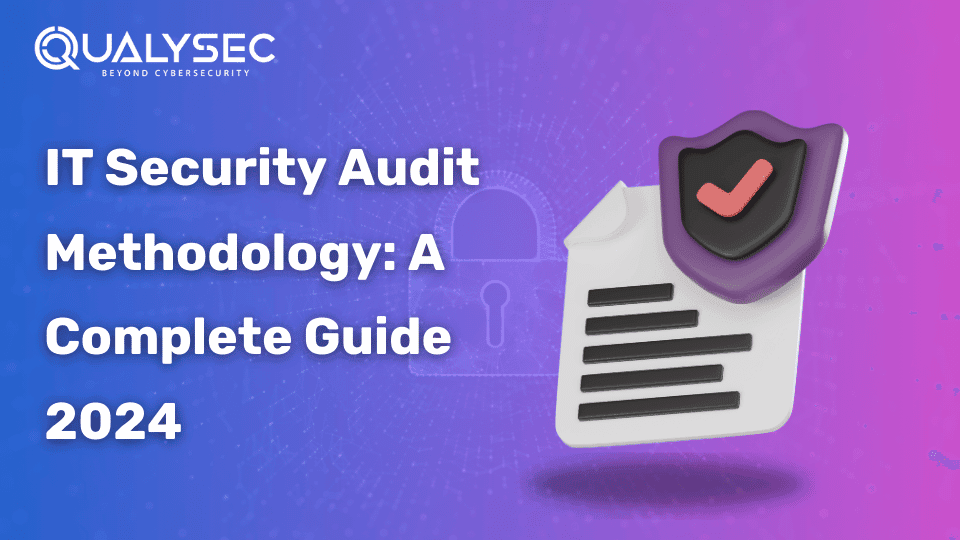

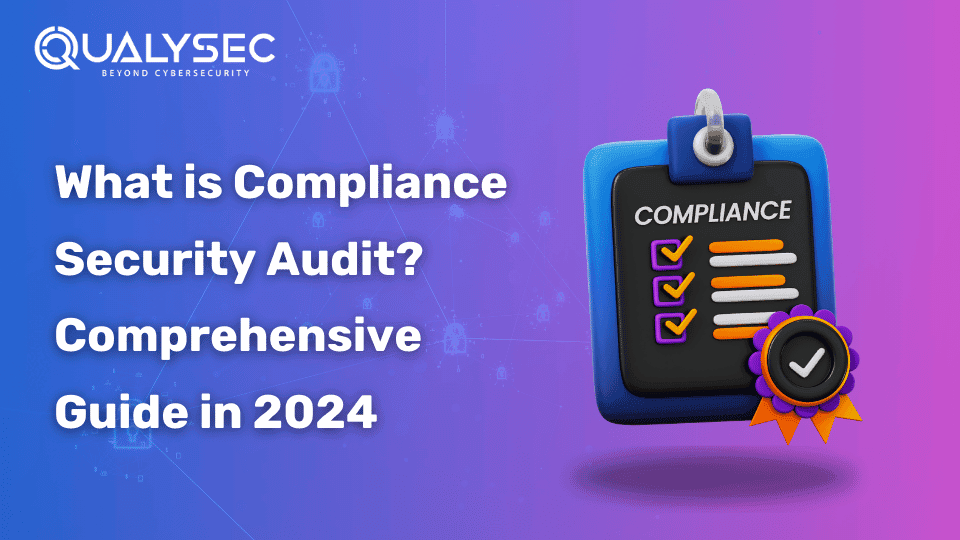


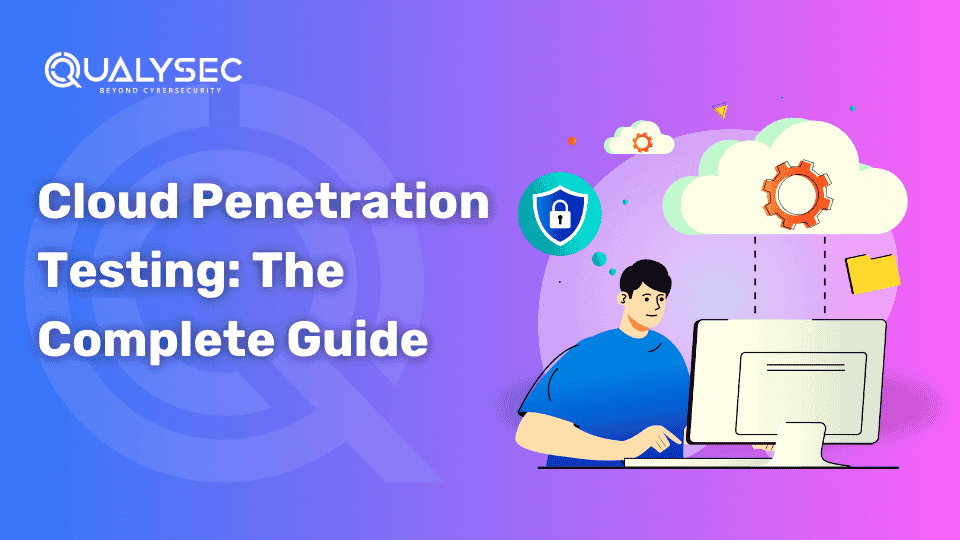





























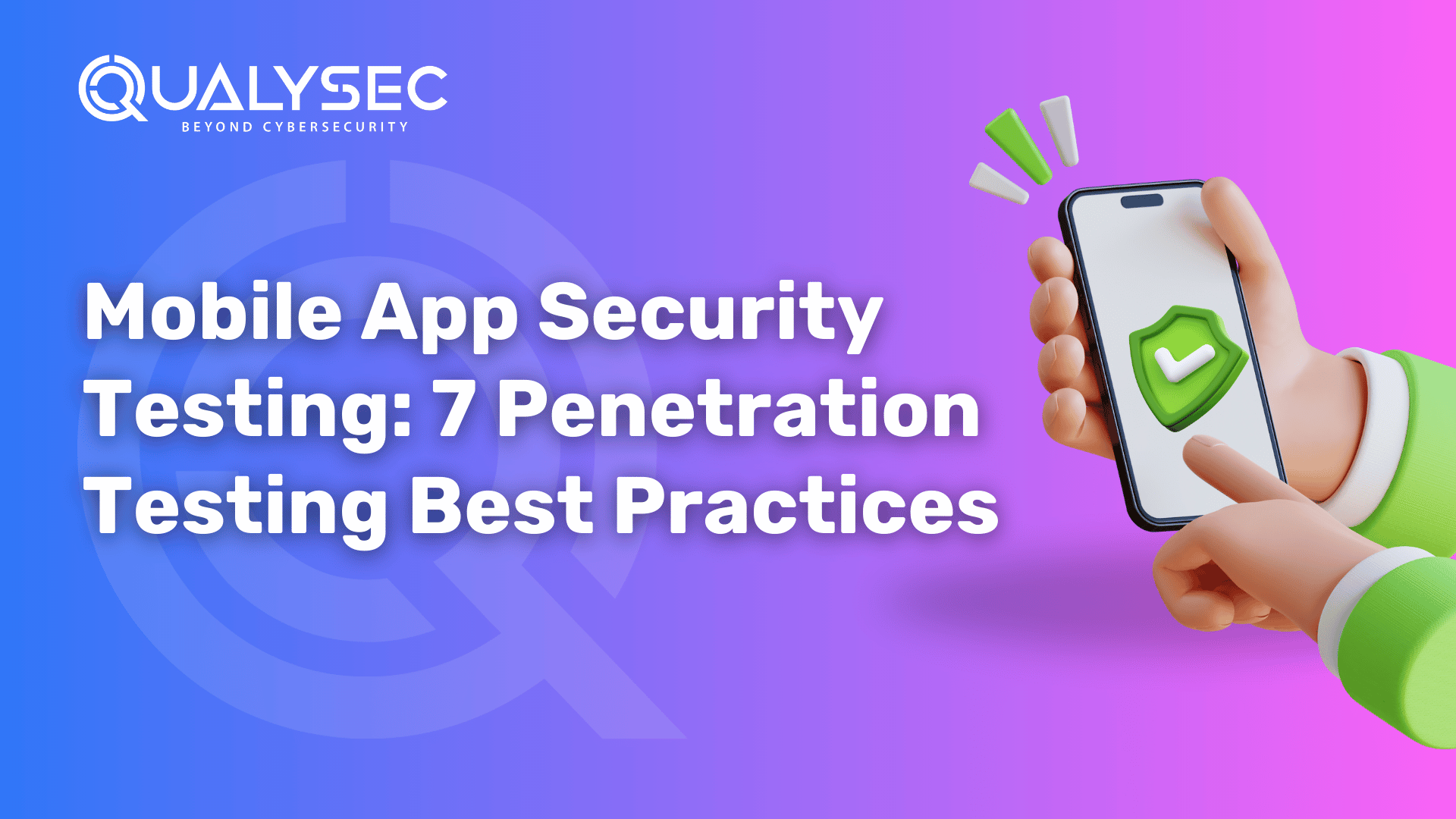

















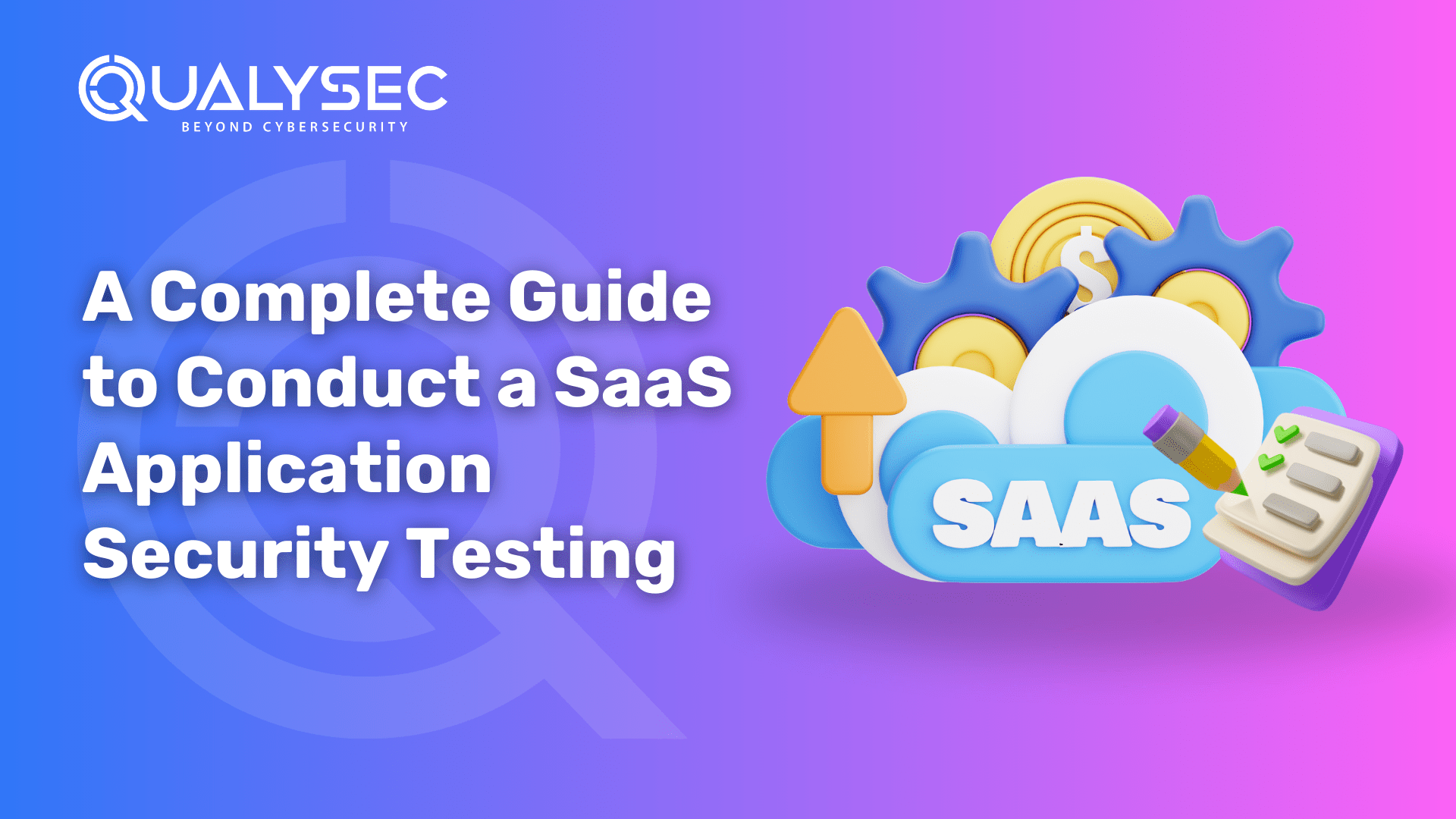





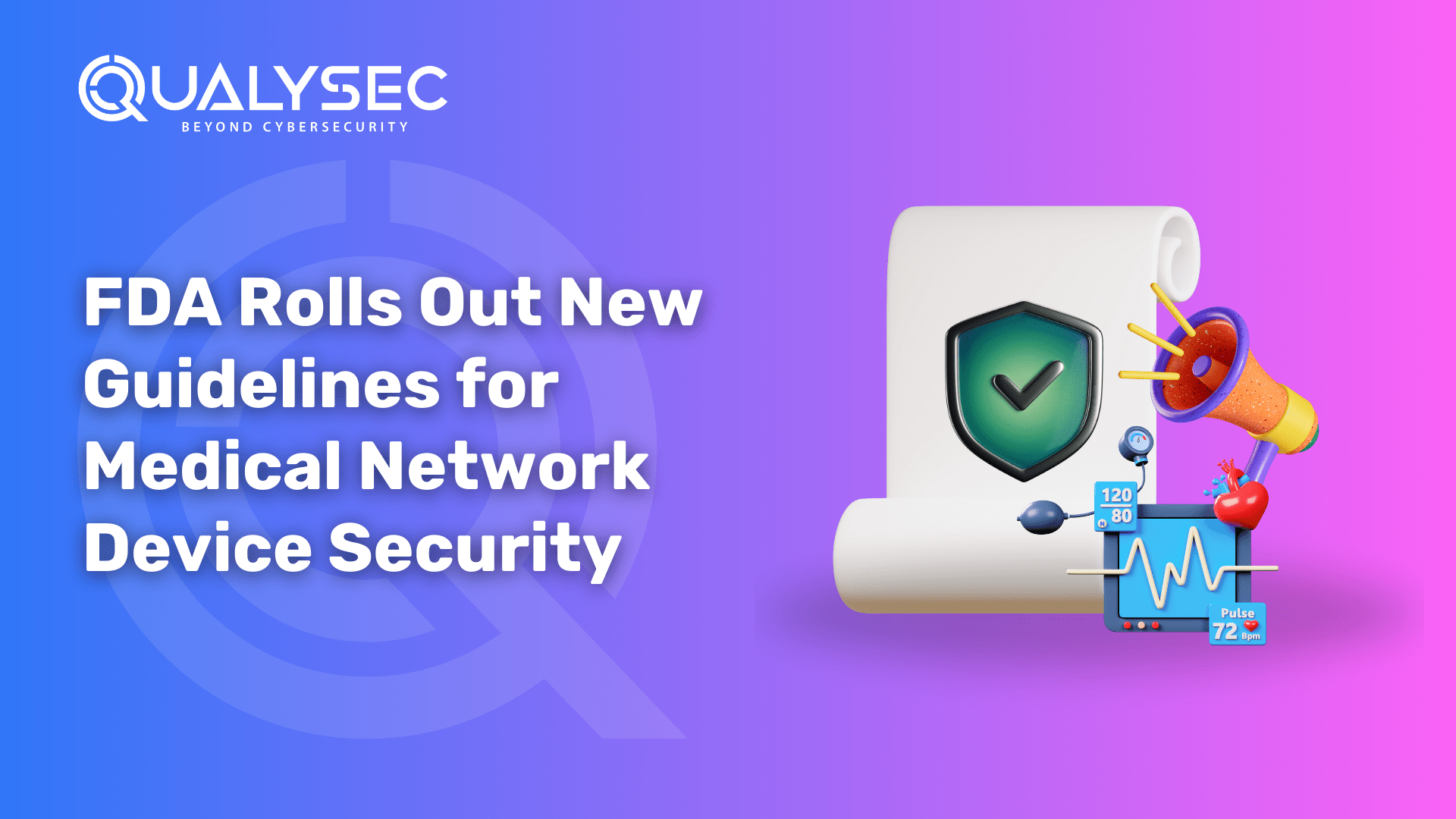















































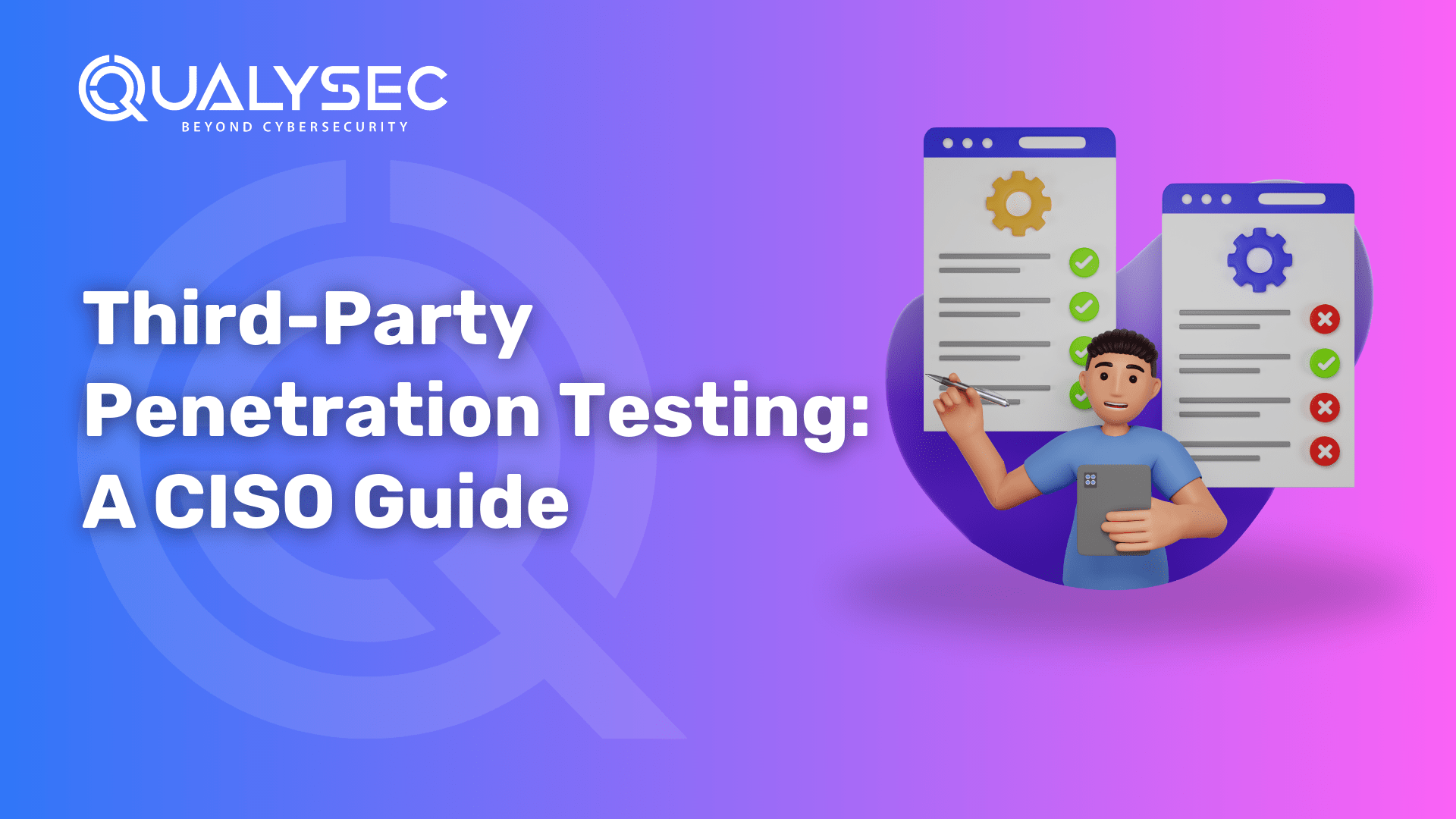





































































































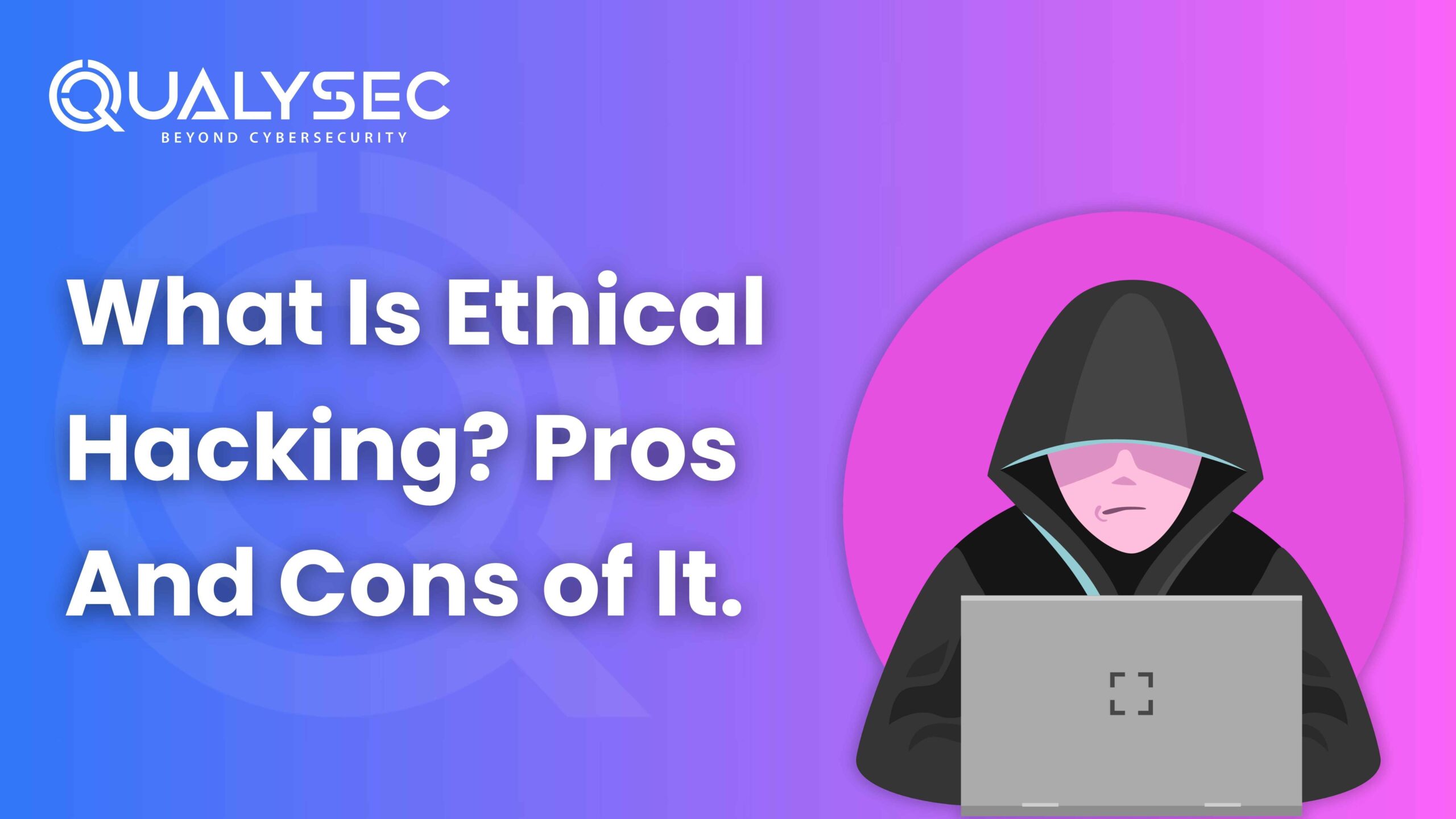







































0 Comments